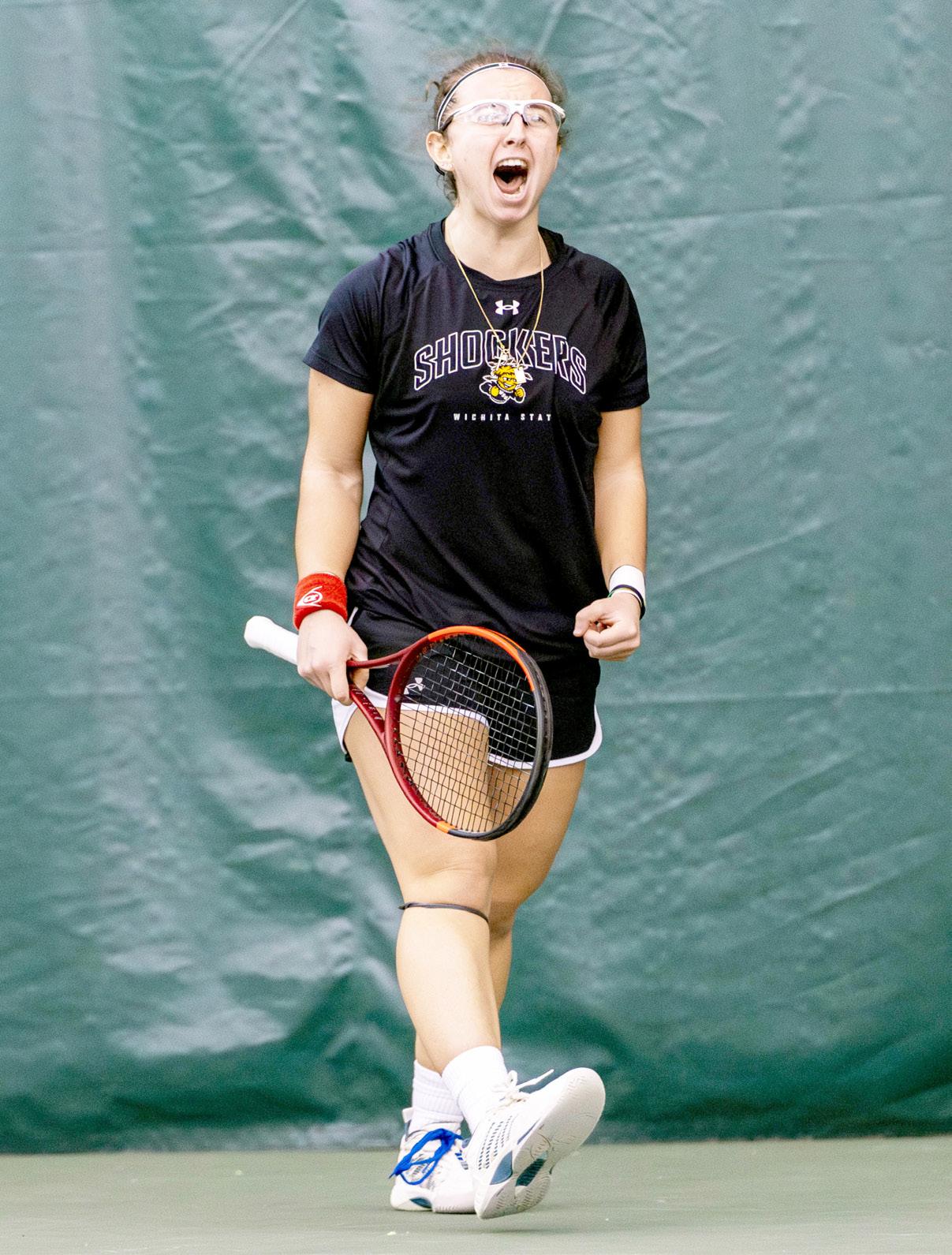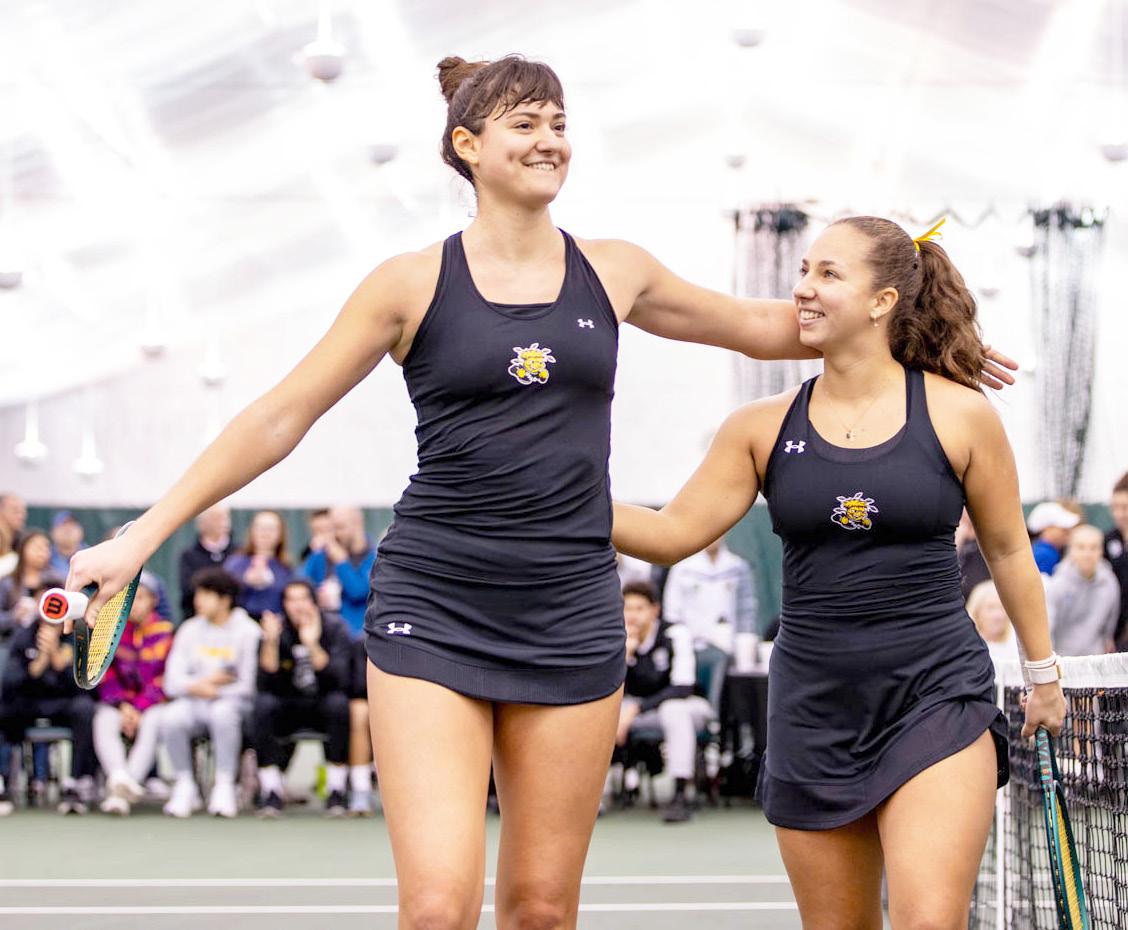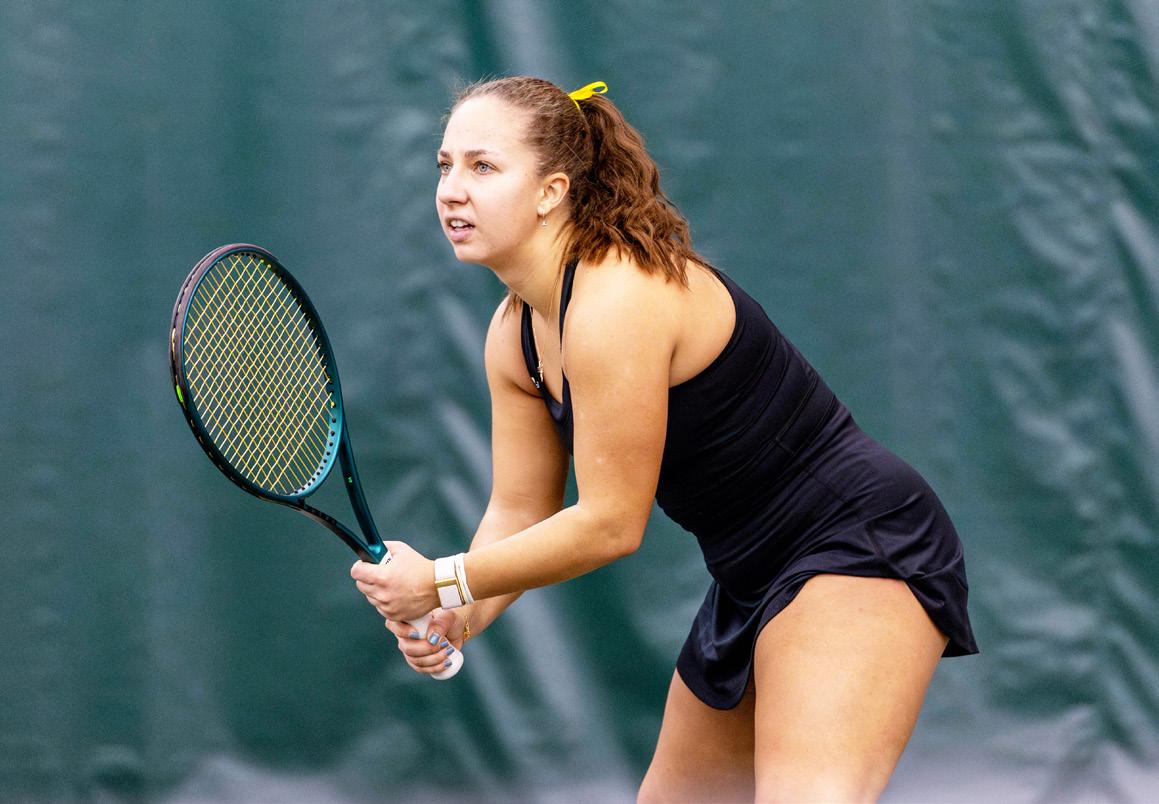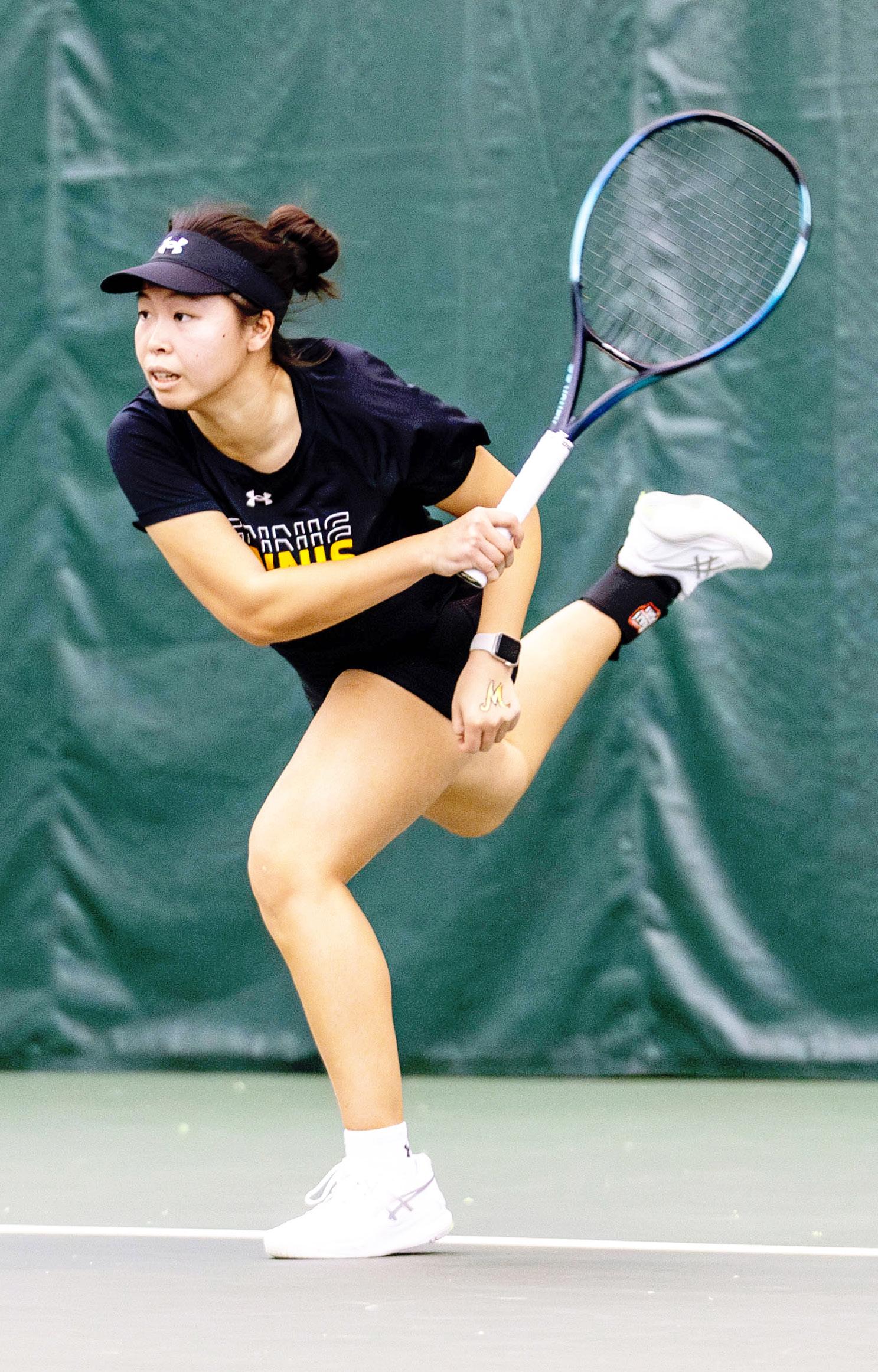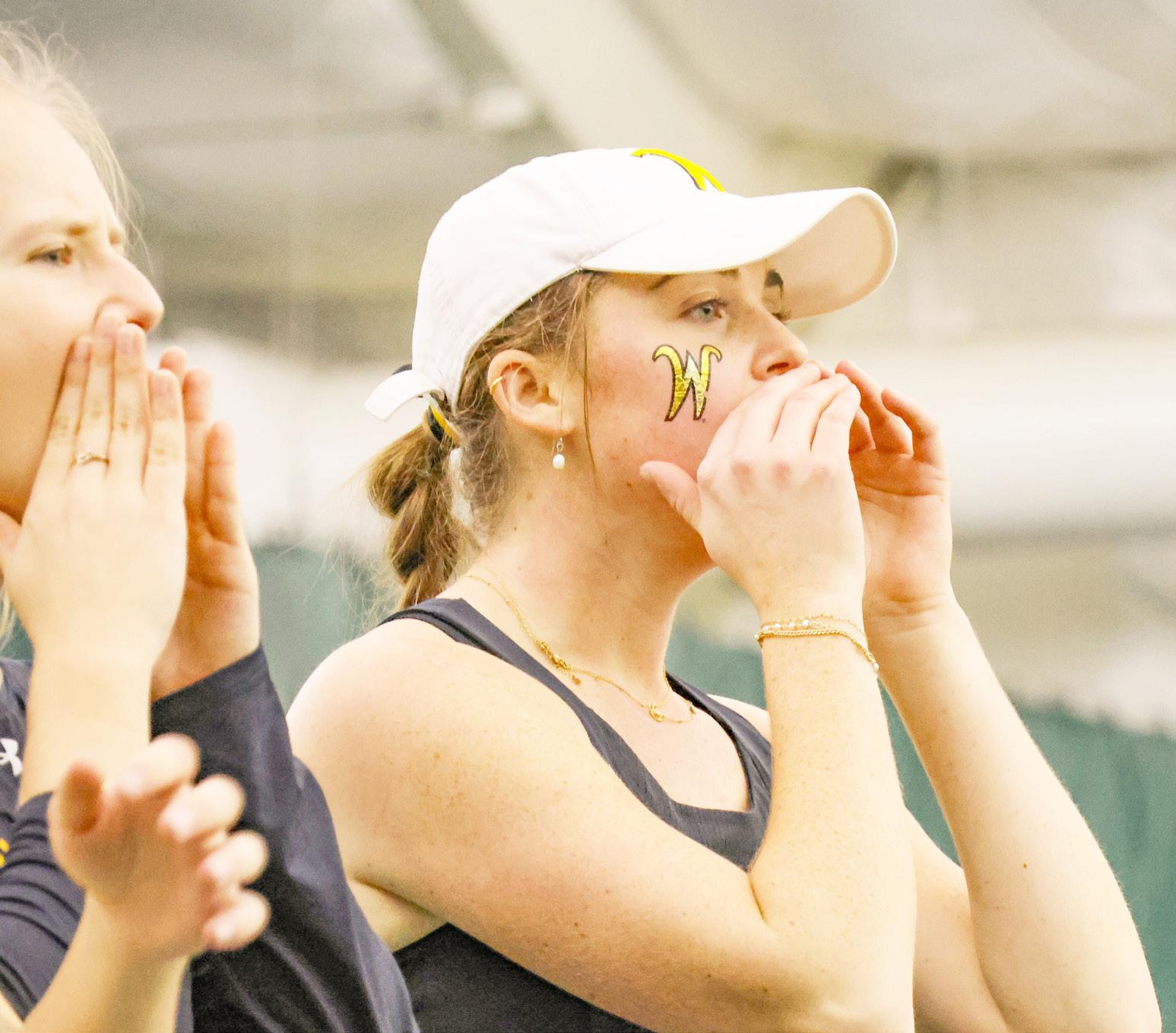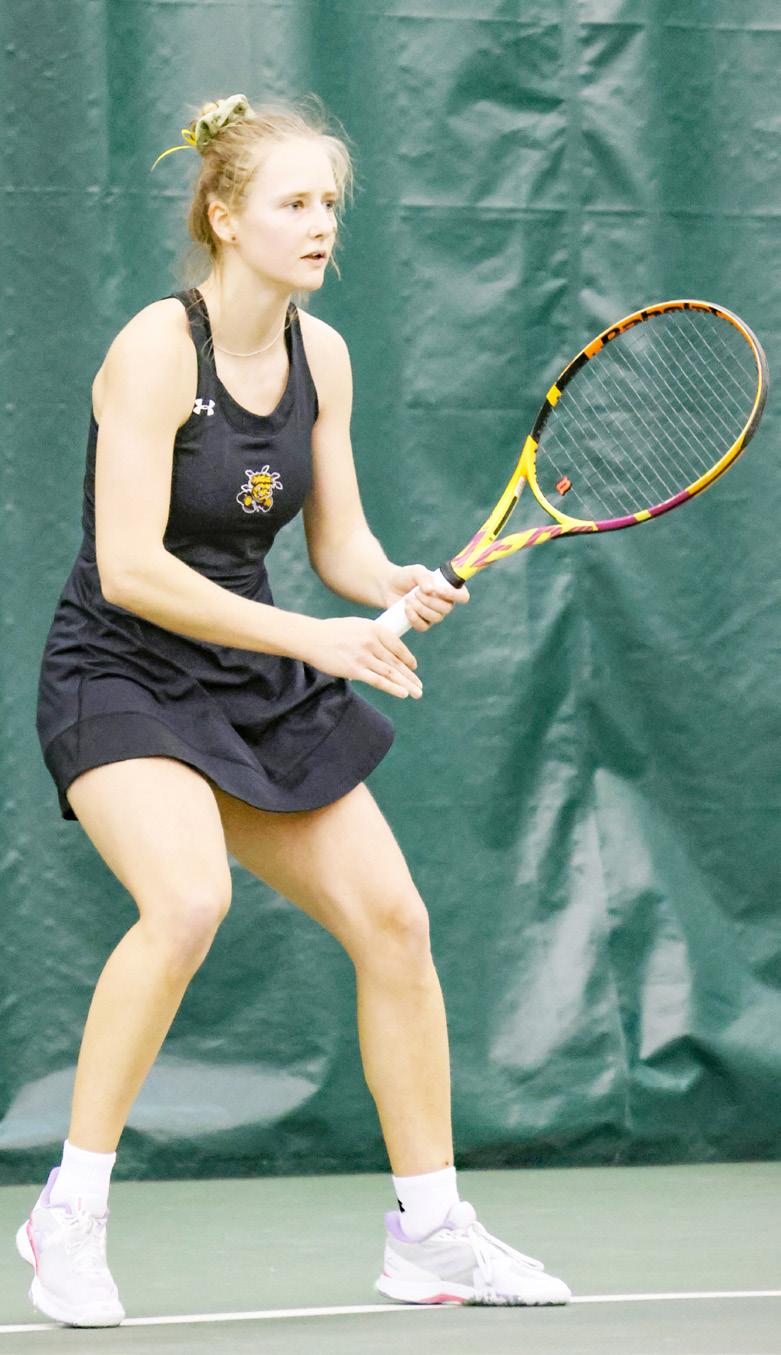LEAPS & BOUNDS

WHAT’S INSIDE
Pg 3 | Preview the baseball and softball season
Pg 5 | Lauren Lucas returns to Wichita State
Pg 7 | See how a disc golf coach runs his class



Pg 3 | Preview the baseball and softball season
Pg 5 | Lauren Lucas returns to Wichita State
Pg 7 | See how a disc golf coach runs his class

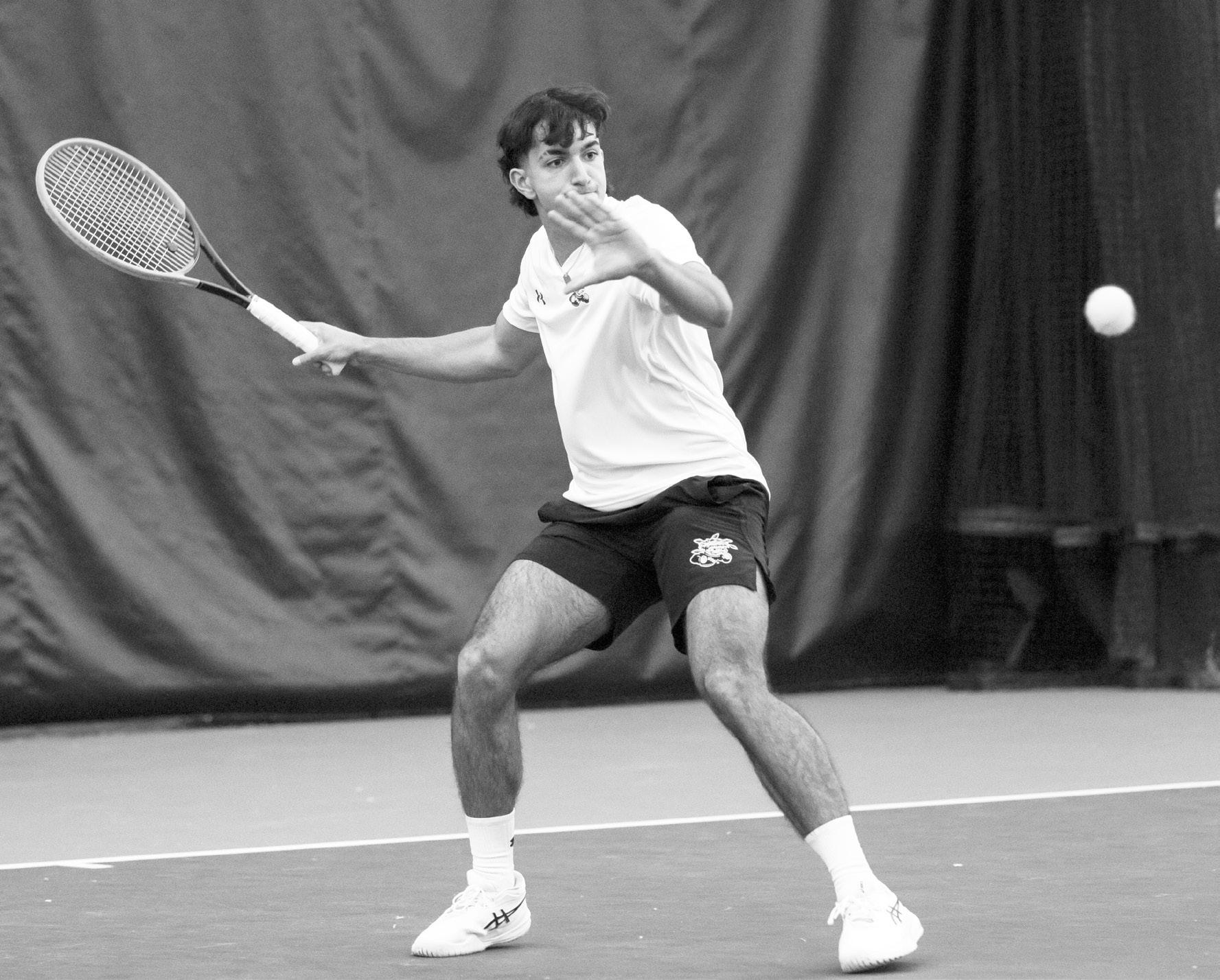
BY OWEN PROTHRO owenprothro@gmail.com
Over the offseason, Wichita State men’s tennis lost two players through graduation — Marcelo Sepulveda and Misha Kvantaliani — and sophomore Richey King, who transferred to the University of Kansas and no longer plays tennis.
As a result, head coach Darragh Glavin signed four freshmen — Zaid Al Mashni, Amir Milushev, Luca Mindrut and Ilias Worthington — and a sophomore transfer from Queens University in Charlotte, Arenui Luethi, to beef up this year’s roster.
When recruiting, Glavin wanted hungry players who strive to continue working and developing their games, noting the energy of the players he brought in.
“They’re competitors,” Glavin said. “They’re going to be ‘tough to beat,’ kind of guys. So I think they’re going to bring the team together and … bring a good atmosphere on the court and just (a) ‘leave it all out there,’ kind of attitude.”
Last year, the Shockers finished with a 5-18 record, ending the season with a loss against the University of Tulsa in the first round of the American Athletic Conference (AAC) tournament. Glavin is entering his third year at the helm of WSU.
With no seniors on the team, Glavin pointed to juniors Luke Bracks and Kristof Minarik as the new leaders of this year’s group of players, saying that the two help the underclassmen figure out the “day-to-day” tasks, answering any questions they bring because “they’ve been through (it) at least three times around.”
Bracks shared the sentiment.
“We have to hold each other accountable,” Bracks said. “If you see something … you have to let them know in a positive way. And also, just (leading) by example. If you do it and they see it‘s successful, everyone tends to end
MISSION
up doing a successful (job).”
Despite Minarik and Bracks stepping up for the time being, Glavin said, “We’ll see … as the spring goes on, who’s really going to stand out as a leader.” But for now, “those two are the ones that have kind of stepped up a little bit more right now, as the upperclassmen.”
With each offseason comes development. While the WSU men’s tennis team geared up for the spring season, Glavin said Bracks has improved his singles and doubles game and is excited to see what he can do throughout the season.
“I think right away (in) both singles and doubles, he’ll be right there knocking on the door, being in the lineup, being able to push guys,” Glavin said. “And when he gets his chance, I know he’s going to be ready to go because he’s proven he can beat that level at the top.”
From a player’s perspective, Bracks thinks Worthington, Minarik and junior Alejandro Jacome have made major strides over the offseason.
Minarik and Jacome both made history during the fall, becoming the first WSU duo to reach the doubles qualifying round of the Intercollegiate Tennis Association All-American Championships since 2011. The pair also advanced to the doubles semifinals of the AAC Individual Championships.
During the AAC Individual Championships, Minarik reached the round of 16 before falling in two sets.
Despite not playing for WSU over the fall, Worthington has “a lot of talent (and) young energy,” according to Bracks.
“He’ll bring a young kind of fire and energy,” Bracks said. “He’s going to bring in passion … he’s an aggressive tennis player as well, so (it’s) good to have that as a player.”
The Sunflower — both in print and online — will be a timely resource of information about the Wichita State University community. It will report on news, issues, activities, academics and athletics, in addition to offering a forum for discussion, reviews and commentary. It will also be an effective learning experience for students, who will have the final authority over what is published.
The Sunflower is a member of the Associated Collegiate Press, College Media Association and the Wichita Journalism Collaborative.
LEGAL One free copy of The Sunflower is
Even though the team brought in five new players this season, Glavin doesn’t expect that the play style will change too much — he’ll add their skill sets where they fit.
As far as anything new goes, Bracks said the biggest difference between this year’s team and last year’s is the coaching staff. The team brought in a new assistant coach, Sonam Phuntsok, and a new graduate assistant coach, Joan Grosset.
“They’ve been good additions so far,” Bracks said. “(They have) good, positive inputs for the team and (bring) different insights.”
Glavin said he expects the young group to focus on improving every day in practice.
“We have a team that … every match we play, we can win,” Glavin said. “So I’m excited to see us kind of just progress throughout the season and just competing, leave it all out there and focus on getting better each day.”
Bracks said the team has a shot at a winning record, which would be their first since the 2020-21 season.
“(But) the main goal is to build our team at our level, to have a good, deep run in (the) conference and have a shot at (winning the conference tournament),” Bracks said.
Glavin said the season will be successful if the team can win the AAC Championship and make the NCAA Championships.
“But I think it’s just knowing that we’ll have competed in every single match,” Glavin said. “And if we win, great; if we don’t, then we know the other team was just too good on that day. I think that will be a success for us — if we can look back at all our matches and know there’s not much more we could have done and we left it all out there.”
BY JACOB UNRUH sports@thesunflower.com
Steve Rainbolt has been the director of Wichita State’s track and field program for 25 years. He doesn’t go into every season expecting to compete for a conference championship.
This year, he is — especially on the men’s side.
“Our men’s team is pretty darn good,” he said. “We have got good athletes in ... literally, almost every single event.”
Last year, the WSU men’s and women’s teams finished fifth in the American Athletic Conference (AAC) indoor championships and fourth in the outdoor competition.
It was a result that Rainbolt celebrated. But this year, the expectations are higher.
On the men’s side, Rainbolt said Wichita State has the talent to compete with last year’s powerhouse team, the University of South Florida. The WSU women, still rebuilding from a COVID-era rough patch, still may not have the firepower this year to win the conference — but Rainbolt is expecting forward momentum.
“If we’re (WSU women) top three, I’ll be celebrating,” he said.
MEN’S TEAM
Two key contributors graduated from Wichita State in the offseason: high jumper Brady Palen and hurdler Joseph Holthusen. Rainbolt said the team has found adequate replacements in freshman jumper Darius Graham and sophomore hurdler Tyler Carroll.
“Did we replace Brady at the national level?” Rainbolt said. “ … Probably not initially because we’re talking about a true freshman, but this guy’s (Graham) really good.”
Between some men redshirting last year to preserve their eligibility for this season and a strong recruiting class, Rainbolt is optimistic about the athletes at his disposal. One standout is senior sprinter/hurdler Jaleel Montgomery, who already set the second-fastest 200-meter time in WSU history in January.
At the AAC indoor championships last year, Montgomery suffered a fall in the hurdles that disqualified him from the meet. It left him with a huge scar on his back and motivation to come back stronger this year.
“Of course, I can be mad about it for a couple (of) days, but then I got to get over it because I still have another season — one more, the last one,” he said. “So just take that as a strength … a fire lit.”
Montgomery said the team feels like a family this year, picking each other up in practices and motivating each other to succeed.
“Everyone has their strengths and weaknesses when it comes to individual races or just, not only as, like a teammate, but (as an) overall person,” Montgomery said. “But when you come here ... we all just come together.”
The Wichita State women’s team comes in with more question marks than the men’s side, but Rainbolt still praised the balance on the roster.
“The strength that I feel like that we have in women’s track is our balance,” Rainbolt said. “There’s

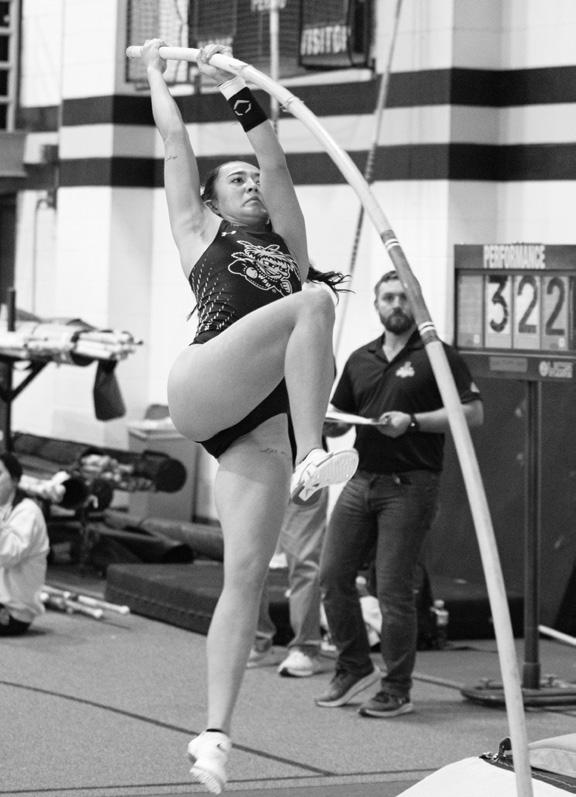
good athletes everywhere. We’re still developing to try to have great athletes in some of those events, but good performances in the distance group, good performances in the sprint group … good performances in hurdles … And then the pole vault is going to come back and be a scoring event, an event that we’re going to be battling for scoring finishes in the American (AAC), and I think our throwers are going to be improved this year.”
One reason for optimism is a high level of continuity on the women’s side. The team lost just one point-scorer from last year’s AAC competition — thrower Anna Zimmer — and her sister, senior thrower Kylie Zimmer, looks set to replace that production.
However, senior distance runner Lucy Ndungu, who finished 17th at the NCAA Championships last year, is still recovering from surgery on a broken pinky toe.
“If we don’t have her (Ndungu), we’re not as good, because she will score in two events nicely,” Rainbolt said. “... So we need her to continue this upward trajectory of our women’s program.”
The biggest individual standout on the women’s side is senior Destiny Masters, who earned multiple All-America awards in the high jump and pentathlon last year. Masters’ training partner, sophomore Brianna Utecht, is also back this year after not competing last season.
“I feel like we have a really good, solid multi group,” Masters said.
Masters said the WSU women want to be compared to the men.
“Everyone’s talking about how great they are and how they are going to be (at) the top, and they’re hitting on all cylinders,” she said. “I think the girls want to be doing that, too.”
Last year, three athletes represented Wichita State on the NCAA stage — Masters, Palen and Ndungu. Rainbolt named several Shockers he could see qualifying to that level this year, a list that includes Montgomery and Utecht.
Montgomery said he has a goal of making it to nationals, but for now, his main goal is just beating his own times. He said he’s been encouraged by the other hurdlers and sprinters.
“We push each other every single practice, rooting each other on so that it gives us a little bit of a feel to when it comes to meets, when we’re all spread out,” Montgomery said. “But the support and love is still there because we know in the end, we can really battle with South Florida.”
editor@thesunflower.com
FACULTY ADVISER Amy DeVault: 316-978-6052 amy.devault@wichita.edu EDITOR-IN-CHIEF
PODCAST PRODUCER Taliyah Winn podcast@thesunflower.com
ADVERTISING MANAGER Kiona Brown admanager@thesunflower.com
ADVERTISING Kiona Brown: 316-978-6905 admanager@thesunflower.com
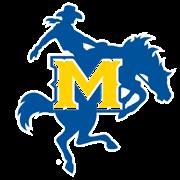






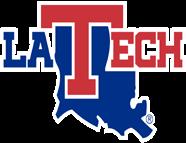







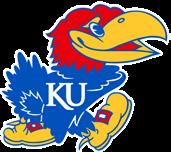
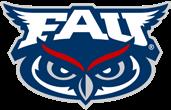







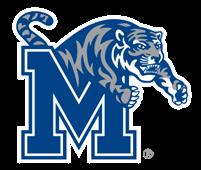
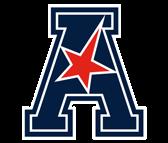
BY OWEN PROTHRO owenprothro@gmail.com
Last year, a walkoff home run in the championship game of the American Athletic Conference (AAC) tournament ended Wichita State’s baseball season. It’s a game that returning players have thought about every single day since then.
But instead of feeling down, senior catcher Mauricio Millan is using it to drive this season’s ambition.
“I try and tell the guys all the time to use that as motivation … when (you’re) having a crappy day,” Millan said. “Like, remember that feeling and just kind of embrace that feeling because being one pitch away from going to a regional for the first time in (nearly) 13 years with a brand new coaching staff, after the April that we kind of had last year, just says a lot about how close that group really was and how tight our locker room was.”
Second-year head coach Brian Green said “our vision is very simple.”
“And, you know, it’s our vision to play baseball in June,” Green said.
The Shockers kept 23 players from last year’s roster, a high retention rate according to Green. Most notably, they’ve kept seven starting position players and two starting pitchers with four players named preseason All-Conference members in the AAC. The Shockers were picked to finish second in the AAC in the preseason coaches poll.
A total of 14 players were brought in through the transfer portal, including five from Power Conference schools. Five true freshmen will also join this year’s team.
Green said the biggest difference between this year’s team and last year’s is maturity.
“The experience and the lack of drama and the leadership — those are things that really stick out on this team,” Green said. “We act old. We play old.”
Green also said the players’ work in the weight room has paid dividends. They’re taking care of their bodies through the right nutrition and sleep schedules.
“And we’re seeing it on the field,” Green said. “It’s a different vibe on the field, you know, we’re definitely a very physical team.”
Despite the team being more physically and emotionally mature, they’re going to have to push through April and May if they want a shot at playing in June. But before any of that can happen, they will begin their season with a long stretch of eight games in 10 days — all on the road.
“It is definitely going to be mentally challenging for us,” Millan said about the long road stretch. “But I think we have the experience to kind of handle that.”
The Shockers lost two key contributors on the mound from last season: Favors, who was selected in the sixth round of the MLB Draft, and Tommy LaPour, who transferred to Texas Christian University.
Even without Favors and LaPour, Millan said the team added depth to the starting lineup and bullpen.
Out of the ‘pen, senior Hunter Holmes and junior Caleb Anderson took most of the brunt of last year’s innings, with Holmes ending it with the most appearances in the country. This year, it will be different.
“When you’re pitching that often, fatigue is going to play a factor,” Millan said.
Seniors Grant Adler and Jace Miner and junior Aaron Arnold are some of the new additions to the mound. Millan said Adler and Miner will help the team with their experience, adding that Arnold’s recent play has been impressive.
Overall, the pitching crew will be a “much longer” group of players, not only in stature but longevity in games. It will allow others to have much-needed rest.
With the offseason lifting and
training, this team’s bats will compete for spots in the lineup. Green said there are around 12 players who have the potential to be opening-day starters. Deciding the right lineup will be a challenge.
Seniors Ryan Callahan, Owen Washburn, Jordan Rogers and Cole Dillon, junior Jaden Gustafson, sophomores Lane Haworth, Kam Durnin and Kaleb Duncan as well as senior infielder Josh Livingston and Millan were named potential starters for opening day, but the lineup is anything but solidified.
Green said that Livingston “is hammering the ball right now,” making a push for the starting spot. Livingston’s bat caught fire near the end of last season, hitting .333 in the 12 league games. Despite the personal accolades, Livingston said it’ll be a team effort, no matter what.
Green said his inaugural year was about “just trying to figure out what planet you’re on.”
Today, he better understands the schematics and culture of WSU baseball. Green said making an NCAA Regional is the ultimate goal in year two, but there are some key improvements the team must make along the way.
“Can we drive the strikeouts down? Can we drive the walks up? The HBPs were great, but can we close that gap?” Green asked. “We’re going to be longer on the mound. We’re going to have more range defensively. Can you see us steal a little more bases? You’ll definitely see that.”
To improve in those areas and make the late-season push, the team must start strong in its non-conference schedule, which will bring confidence into AAC play.
“We want to put ourselves into a position of just being really competitive and tough and confident when we start conference play,” Green said. “I know as a coach, I think our players know it, but we’ve got a very challenging non-conference schedule.”
After falling short last year, ‘bitter’ softball team looks to bounce back
BY JACOB UNRUH sports@thesunflower.com
Last year, Wichita State softball failed to make an NCAA Regional for the first time since 2020, losing the American Athletic Conference (AAC) championship game on home turf.
It’s an outcome some players still think about — and they’re determined to start stronger this campaign.
“I think everybody’s got a nasty taste in their mouth,” graduate student Lauren Lucas, who missed last season with an injury, said. “It’s not typical of our program for things to not fall our way … (so) we’re coming back better than before.”
Wichita State was picked to finish first in the AAC in the preseason coaches poll. Still, head coach Kristi Bredbenner isn’t taking anything for granted.
“It’s going to be a dog fight,” she said. “I mean, just like it was last year, you know, every single day, you’ve got to show up and play and be ready to go.”
The return of Lucas, a thirdteam All-American as a junior, will be a major boost to WSU’s lineup.
“It’s nice to have somebody who’s been through the grind from a leadership perspective,” Bredbenner said. “That has the at-bats, that has the experience and has that level of success … that’s been a huge key for us this year.”
The Shocker infield will largely remain the same as last year. Bredbenner said two players are the best at their position in the conference: senior third baseman Krystin Nelson and junior second baseman Sami Hood.
Junior Taylor Sedlacek bopped 14 home runs last year, which tied for the second-most on the team.
She will continue to play shortstop, and senior Caroline Tallent will play at first base.
Comparatively, the outfield will be all-new this year, with Lucas joined by two transfers: junior Jodie Epperson and graduate student Ellee Eck. Bredbenner said the outfield will be “super fast,” with true freshmen Morgan Lloyd and Brookelyn Livanec making a case for playing time.
“Our defense is going to be key,” Lucas said. “ … I think speed will be a big game changer for us.”
The biggest question mark in the lineup, according to Bredbenner, is at catcher. Sophomore Sophie Johnson and freshmen Catelyn Beckerley and Gabby Scott will compete for playing time.
Last year, the Shockers ranked 272nd in the country in stolen bases per game out of 296 teams. This year, Bredbenner wants the team to place in the top 100.
“We’ve got to find ways to drive the runs in with line drives, ground balls … and those types of moments,” Bredbenner said.
“Those are some of those lessons learned that we struggled with a little bit last year, that we’ve got to change for this year.”
WSU will sport a young pitching staff this year. Returning junior Alex Aguilar and sophomore Chloe Barber will be joined by redshirt freshman Erica Schertz and freshmen Ava Sliger and Ryley Nihart.
Barber led the team in wins, earned run average and started last year as a true freshman. Bredbenner said she could be “one of the best pitchers in the country” — but she has to have that confidence in herself.
“That’s going to be what’s going to be her bread and butter, is, can she stay level-headed in the game
and not be so hard on herself?”
Bredbenner said. “That’s where she got herself into trouble last year.”
Aguilar battled through injuries a year ago, resulting in a worse season statistically than her 2023 campaign. Now that she’s healthy, Bredbenner said the team is counting on her for leadership.
“She’s become more of a leader in that bullpen because she does have a lot of young eyes looking at her,” Bredbenner said. “ … Having her healthy and really confident in her abilities is going to be a big one for us.”
The pitch-to-contact approach will be boosted by what Bredbenner expects to be a “special” defense that will help the staff.
“We’re going to try to turn double plays and … throw out runners. And we’re going to have to be able to make big plays in the outfield,” she said.
WSU will face a challenge with its non-conference schedule. The Shockers will play 11 power-conference opponents this season.
Bredbenner admitted that missing the NCAA Tournament last year was and continues to be a “thorn on the girls’ side.” Still, she’s focused on seeing improvement during the year.
“I think the biggest thing is we (have) just got to continue to keep getting better every single day, and when that first weekend rolls around, set the tone and continue to grow from there,” Bredbenner said. Lucas summed up her mindset going into the season.
“We’re hard-headed, we’re stubborn, we’re bitter about not seeing the postseason last year, and we’re going to come back with a vengeance,” Lucas said. “And if I were other teams, I would be worried about us.”




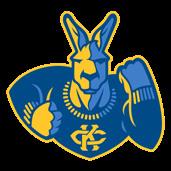















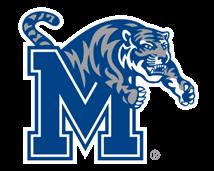


Baseball’s Josh Livingston went through a massive hitting slump last season. He’s glad it happened.
BY JACOB UNRUH sports@thesunflower.com
Josh Livingston began his first season with Wichita State baseball in a terrible hitting slump that he said left him with numerous sleepless nights. At the end of April, Livingston was hitting .196 with 17 strikeouts. He struggled to stay in the lineup.
Now a senior, Livingston is thankful he went through the slump.
He ended last year scorching hot in May, going 11-33 over the last nine games of the year. That included a run of four homers over his five games in the American Athletic Conference (AAC) Tournament.
“At the beginning of the year, obviously, I didn’t get off to a good start,” Livingston said. “But no matter what happened … I treated
every day as if I was going to play every day.”
It wasn’t the first time Livingston went through a big slump. During his freshman year at Crowder College, a junior college in Missouri, Livingston hit .380 over his first 21 at-bats of the season.
Then, he went 0-4 with four strikeouts in a game against Iowa Western Community College. It was his first time ever reaching a quartet of strikeouts.
“And ever since that moment, I was never the same player that season,” Livingston said.
The statistics back up his assessment. Livingston hit just .238 the rest of the way, eventually getting benched.
But the next year, he came back to become a National Junior College Athletic

Association (NJCAA) Third Team AllAmerican. He used that experience as a reference during his slump as a Shocker.
“You’re like, ‘I know I can do it because I have done it before,’” Livingston said.
It didn’t make going through the slump any easier, though.
“It’s a lot of wishing you would have done something else or something different,” Livingston said. “You know, hoping that, like, one day it’s going to click.’”
One day, it did.
In the final regular season game against the University of Memphis, Livingston stepped to the plate in the bottom of the seventh inning with the Shockers behind, 7-5. He vividly described what happened next.

Jace Miner and Grant Adler return to Wichita State after transferring out for one year
BY MACK SMITH
mackred22@gmail.com
Jace Miner and Grant Adler left Wichita State’s baseball program after the 2023 season, but after one season away from the ICT, the senior pitchers are back.
Wichita State head coach Brian Green said he asked senior catcher Mauricio Millan about bringing the players back through the transfer portal.
“He (Millan) goes, ‘No, we want him back coach,’” Green said. “But I just think it speaks to these guys’ and players’ talk. You know, the locker room is what drives where you want to be.”
JACE MINER: FROM WICHITA TO NORMAN AND BACK
Miner said he feels blessed to be back in Wichita.
“Sometimes when you transfer, you don’t have the opportunity to come back if you transfer again,” he said. “(I’m) definitely blessed, and it's awesome to be around coach Green and have the opportunity to learn from him as well.”
During his first go-around with the Shockers, Miner posted a 4.19 ERA, 65 strikeouts and a 3-3 record
in 38 games.
He was named to the Second Team All-American Athletic Conference (AAC) during his sophomore year as a relief pitcher. After his second year at WSU, Miner entered the transfer portal and committed to play for the University of Oklahoma.
In his lone season in the Sooners’ crimson and cream, Miner appeared in nine games, pitching 7.1 innings. He even faced the Shockers in a midweek nonconference game last season.
“There was some — not anger — but motivation from the way it kind of went down after my sophomore year to get back,” Miner said.
Miner said he’s glad to be back playing with some familiar teammates.
“It’s reuniting almost with family, as a team,” Miner said. “It was pretty cool to (see) some guys.”
GRANT ADLER: BACK FROM LAWRENCE
Like Miner, Adler said he feels blessed to be given another opportunity with Wichita State. Adler played for the University of Kansas last season.
“I ended up getting hurt last year at KU,” Adler said, “Which I thought was going to be my last year of college baseball, and (I’ve been) blessed with another year. I grew up here in Wichita; this is where I always wanted to play.”
Out of high school, Adler ended up playing for Cowley College, a junior college in Arkansas City, which is nearly an hour's drive from Wichita.
After two years there, Adler committed to the Shockers. During his year at WSU, Adler was named AAC Newcomer Pitcher of the Year while having the best-qualified ERA in the conference at 2.55.
After the season, Adler transferred to Kansas. Adler’s one season with the Jayhawks was cut short due to injury; he only appeared in four games before returning as a Shocker.
“This is where I've always wanted to play,” Adler said. “This is where I've grown up, and I couldn't be more happy to be back.”
WSU pitching coach Anthony Claggett said both pitchers coming back has been great for the program.
“It's a real honor to have them back,” Claggett said. “And they've been doing really good.”
“I got to two strikes, and I hit a curveball for a grand slam,” Livingston said. “And that’s kind of when I was like, ‘Okay, now I feel good’ ... And so that was kind of the moment … where the confidence really clicked.”
WSU head coach Brian Green said Livingston is one of the best hitters on the Shockers’ roster.
“Josh Livingston is hammering the ball right now,” Green said. “His rhythm is great at the plate.” Livingston said breaking the slump was a “big weight off my shoulder.” But in hindsight, he’s glad he went through it.
“Anytime I’ve ever had struggles in my life in baseball, I’ve always come out on the better side of it,” Livingston said.
Michael Mulhollon retires from pitching, joins WSU baseball coaching staff
BY
MACK SMITH mackred22@gmail.com
Junior pitcher Michael Mulhollon announced his retirement from competing before Wichita State’s baseball season started. However, Mulhollon will stay with the WSU baseball program this year as a student assistant pitching coach.
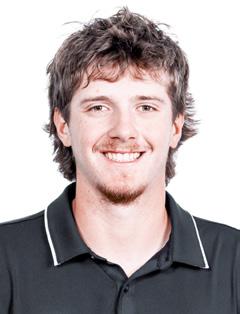
Mulhollon made the difficult decision to leave the field due to lingering elbow problems that began during his senior year of high school.
“We finally went in last year to do surgery and rehabbed all summer, came back through and it ended up getting worse,” Mulhollon said. “So ultimately, we met with (WSU pitching) coach (Anthony) Claggett and (head) coach Brian Green and my family.
“And, we came to the decision that it was best for me to move on from baseball, and coach Green gave me a great opportunity to join the coaching staff.”
Claggett said Mulhollon has been a fantastic addition to the coaching staff.
“It just wasn’t in this path to continue on pitching and be able to be healthy doing that,” Claggett said. “But since his transition over to coaching, it's been the same guy you can trust, a guy that (you) can count on.”
Muhollon said his main responsibility will be assisting Claggett.
“Anything he needs done, I’m
right there,” Mulhollon said. During his two years pitching for the Shockers, Mulhollon tossed 8.1 innings in 10 appearances. He held a 7.56 ERA and struck out out 11 batters.
During his sophomore year, Mulhollon made his only start in a Shockers uniform in a midweek game against Oral Roberts University. In the game, Mulhollon pitched one scoreless inning and walked five batters.
“It was a great honor to wear the Shocker across my chest,” Mulhollon said.
As a coach, Mulhollon said he hopes to gain experience, build his relationships and create a family.
“Because obviously, in the game of baseball, it's about who you know,” Mulhollon said. “And whatever the future brings me, I just hope to gain trust with this coaching staff.”
Green said he’s glad Mulhollon doesn’t have to worry about injury in his new role — and added that he’s “killing it” as a coach.
“He's going to really help Claggs (Claggett),” Green said. “So it's been a nice addition. Anytime you can get a guy in the program who wants to be a part of it is great, but Mike's doing great. His transition has been fantastic.”
Mulhollon will continue on the same athletic scholarship he received as a player.
He hopes to become a head pitching coach in the future.
“That's my dream job, is to become in a spot where coach Claggett is right now,” Mulhollon said. “But right now, I'm just trying to keep my head down and work as hard as I can here to make this program the best that it could be.”
BY OWEN PROTHRO owenprothro@gmail.com
Wichita State softball’s Lauren Lucas spent her entire 2023 season playing with a nagging pain in her right shoulder. Amazingly, she was a third-team All-American anyway, putting up a .384 batting average and driving in 62 runs on 68 hits. After the season ended, the then-junior outfielder consulted with doctors, who couldn’t find anything glaringly wrong. Lucas said they told her “that if you’re not comfortable having surgery, then you can give yourself the summer off and see if any of the pain … regresses.”
So that’s what she did. But when she arrived for practices that next fall, Lucas worked with a physical trainer, going through throwing progressions, noting she felt the same pain the whole time.
“And so … finally,” Lucas said. “Coach B (head coach Kristi Bredbenner) was like, ‘Hey I need you to try to throw and if you can’t throw, we need to get this fixed.’” No matter how hard she tried, Lucas’ pain would not subside, resulting in her getting her shoulder scoped, revealing a torn right labrum. She eventually had surgery, which she described as having three anchors put into her shoulder to “reupholster the anatomy.”
Subsequently, Lucas missed the entire 2024 campaign, which would have been her senior year. She spent the next eight months rehabilitating her throwing shoulder with hopes of putting on a Shocker uniform again. Now a graduate student, Lucas is “grateful for the opportunity to play a fifth year.”
“And I’m excited to get after it for the last time with these girls and especially (with) the senior class that we have,” Lucas said.
REHAB AND MORE REHAB
For the first month of her rehab process, Lucas said she was “pretty much immobilized.” Doctors had her in a sling to make sure that the anchors they’d inserted were fully set.
BY JACOB UNRUH sports@thesunflower.com
Coming out of Andale High School in Kansas, roughly 30 minutes from Wichita, Ellee Eck initially committed to play softball for Wichita State. But when Stanford University made efforts to recruit her, Eck moved to California because, in her words, “It’s Stanford.”
After four years as a Cardinal — and two appearances in the College World Series — Eck decided to enter the transfer portal prior to her final year of eligibility. She received a text from WSU head coach Kristi Bredbenner the day after she entered the portal, and that was all she needed to know she wanted to come home.
“I remember her (Bredbenner) saying, when I had told her I was going to decommit to go to Stanford, that I’d always have a place here if I wanted it, if anything ever happened,” Eck said. “And so, I don’t know, I just could feel how genuine she was. And you know, that still holds true to this day.”
In addition to the prestige of Stanford, Eck said she initially chose the Cardinal because she wanted to get away from home. But Eck grew to miss her family in Kansas.
“It kind of takes going away from home to realize how good home is,” she said. “So, yeah, I missed my family. I missed (not) missing out on all the big events in their lives, and I was just ready to
While Lucas felt like there was nothing she could do in that timeframe, WSU’s Assistant Director of Sports Performance Audry Horn explained to her, “Yes, you can. There’s stuff that I can have you do so that you don’t lose the strength in your legs while you’re out for the next couple of months.”
Once out of the sling, Lucas gradually progressed from the “immobilized” state to gaining an “average Joe” range of motion. At first, she went through resistance band training, even training with no resistance bands.
“Honestly, our trainer at the time would just … move my arm around herself … especially at the very beginning,” Lucas said. “... It was really odd to have my left arm be stronger than my right arm for probably about six weeks. I was, like, ‘This is awkward.’”
But as the months went on, the weights went up.
“Right around month four (of rehab) was when we started really pushing,” Lucas said. “Right around month four is when they (health professionals) say that, ‘Okay, well, your anchors are not going anywhere. So, you know, really push the weight, really push the rehab. Feel free to kind of let go with your throwing. Like, you know, go a little harder.’”
A couple of months later, Lucas was cleared to participate in practices. Over the summer, Lucas said she even geared up for games in a league.
While Lucas was rehabilitating her season-ending injury, she initially felt there wasn’t much she could do to help the team.
She ended up approaching and working with associate head coach and hitting coach Elizabeth Economon, honing her coaching skills, something she said she wanted to do after graduating.
“(I) helped coach E (Economon) in any way that I could,” Lucas said. “Anything that she asked me to do, I was trying to … be her assistant, really, and just … make her life easier, so that she could make the hitters’ lives easier and … just be of use wherever I could be.”

With the trials and tribulations of missing what would have been her senior season, Lucas took the approach that it would be “a graduate assistant year.”
“Like, I’ll learn as much as I can, I’ll help as much as I can, and I’ll just be as active as I can in … the season without actually playing it,” Lucas said.
Bredbenner said Lucas’ time spent in the dugout soaking in knowledge has given her a different lens to view the game coming back as a player.
“I definitely think she’s got a little bit more of a coaching mind,” Bredbenner said. “And an understanding of how to make adjustments and a desire to have a really great year.”
Now cleared to play in her fifth season, Bredbenner said Lucas’ return is huge.
“Last year, you’re going into the season a little bit and you’re thinking about how exciting it can be,” Bredbenner said. “You’ve got
CC Wong added and (Addison) Barnard and Lauren Lucas coming back who had 70 RBIs as a junior. And … to not have the type of manufacturing (from Lucas) from an RBI perspective, was tough. I mean to me, … that probably wins us six, maybe eight ball games last year.”
Despite Bredbenner’s projection, she is glad Lucas sat out.
“We have her this year, and she’s 100% healthy,” Bredbenner said. “And, you know, could she have sucked it up and played last year at maybe like a 75%, maybe a 60%, maybe by the end of the season at a 50% and not have (had) the best year? Yeah, but you know, we want her to have a great year.”
While injured, Lucas said she nearly lost her love for the sport she’d grown up playing. Now that she’s back, she has a better understanding of what the sport means to her.
“Playing injured, you know, gave me a new appreciation for and a new gratitude for the position that I’m in now,” Lucas said. “I’m
healthy, I’m happy and I’m loving the sport more than I ever have because I know what it looks like without it, and I know what it looks like when I’m in pain.”
In her final season wearing WSU’s black and yellow, Lucas said there are no statistical categories that gauge whether her season will be successful but the memories she’ll make along the way.
“I just want to have fun,” Lucas said. “I want to enjoy my time, and I want to go out on a good note with the team and have a lot of team success.”
LAUREN LUCAS’ 2023 STATISTICS -
I have a better understanding of what makes a College World Series team ... And I’ve really liked assessing Wichita State in that sense, and seeing how much talent we have.”
ELLEE ECK Graduate student utility player “
come home.”
Additionally, the business and lifestyle of California began to wear thin on Eck. She missed the slow pace of Kansas — although she said she could do without the cold weather.
“I was just talking to people about how I had not experienced that cold weather that we just had, like, the past couple weeks in four years, because I’ve been in California for it,” Eck said. “So it was definitely an adjustment, but I’m actually doing a lot better than I thought I would be doing.”
Eck had connections to the Shockers. As a kid, she went to camps and attended some Wichita State games. Her sister, Kasidee, played one year of softball at WSU.
Talking with her gave Eck the “inside scoop” on what being a Shocker would be like.
“She texts me a lot, just making sure I was certain this was the decision I wanted to make, giving me kind of like a neutral standpoint on everything,” Eck said. “… I feel like there really wasn’t any changing my mind anyways, but it was nice to talk to her about it.”
Bredbenner said bringing
Eck back after her previous commitment was a “full-circle moment.”
“(She’s) very humble, and can be a really special player for us,” Bredbenner said. “And so we were really excited to have her back here in Wichita.”
Eck got in the gym and practiced with new WSU teammate and graduate student Lauren Lucas over the winter break. Lucas described Eck as tenacious, fun and a hard worker.
“It was just fun to watch her, you know, kind of come into her own, especially as somebody who didn’t get a ton of time at her previous school,” Lucas said. “Like, it’s been really fun to watch the way that she’ll help us because I know that she will.”
During Eck’s time at Stanford, the Cardinal made the College World Series each of the past two seasons. The experience of playing on that stage meant a lot to Eck, who had watched the World Series live almost every summer growing up. It also gave her a better understanding of what it takes for a team to reach those heights.
“I have a better understanding of what makes a College World Series team, or what makes a Regionals or Super Regionals team,” Eck said. “And I’ve really liked, you know, assessing Wichita State in that sense, and seeing how much talent we have.”
Eck said the Shockers have the
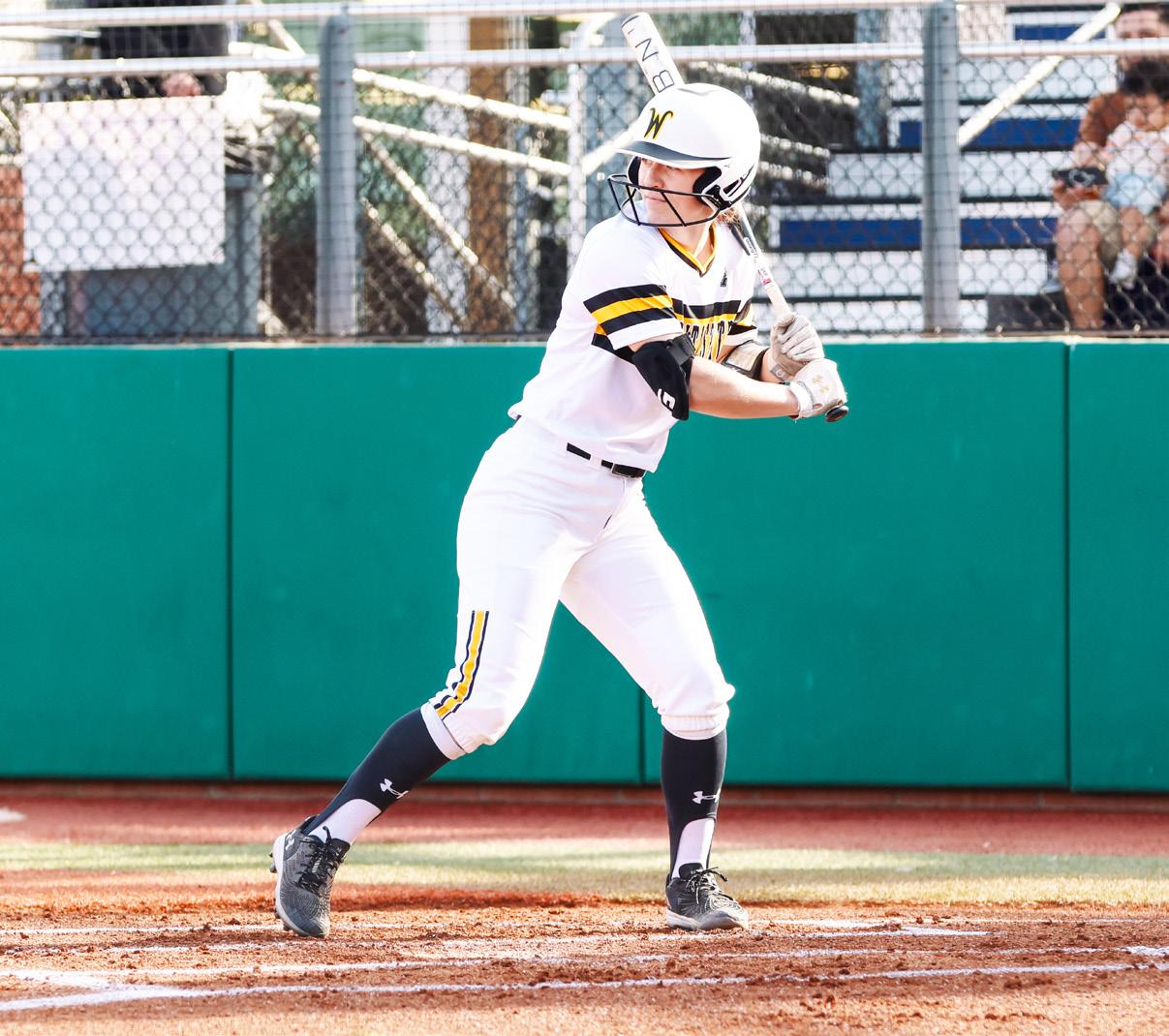
mentality and talent to reach the Regionals and even advance to the Super Regionals of the NCAA tournament.
“Obviously, we have a lot of talent offensively,” Eck said. “We’ve got some power hitters, but we also have people. We have speed too. So you know, doubles and triples are in the cards for us. And defensively, I think things are looking good as well.”
Eck plays a variety of positions on defense, but Bredbenner said she’ll mostly contribute to the Shockers as a speedy outfielder. Bredbenner also values the experience Eck brings to Wichita State.
“When you have an athlete that has made it that far and knows the challenges that you’re going to have to overcome to get there, that’s huge,” Bredbenner said.
Eck said she’s worked to become a leader and mentor on the team. She also teaches athletes off the field as a math tutor.
“It kind of helps reinforce things in my mind,” Eck said. “Like, when I am teaching someone something, or (answering) a question about something, it kind of reminds me … even though that’s kind of muscle memory now, like, it’s still something I need to think about.” Eck doesn’t like thinking about her future plans too much but is keeping an open mind for now.
“I’m very adaptable, and I like to try new things,” Eck said. “So I’m just kind of thinking, you know, once I graduate, I’ll keep an open mind and apply where I can and learn new things, and if it’s not for me, move on.”
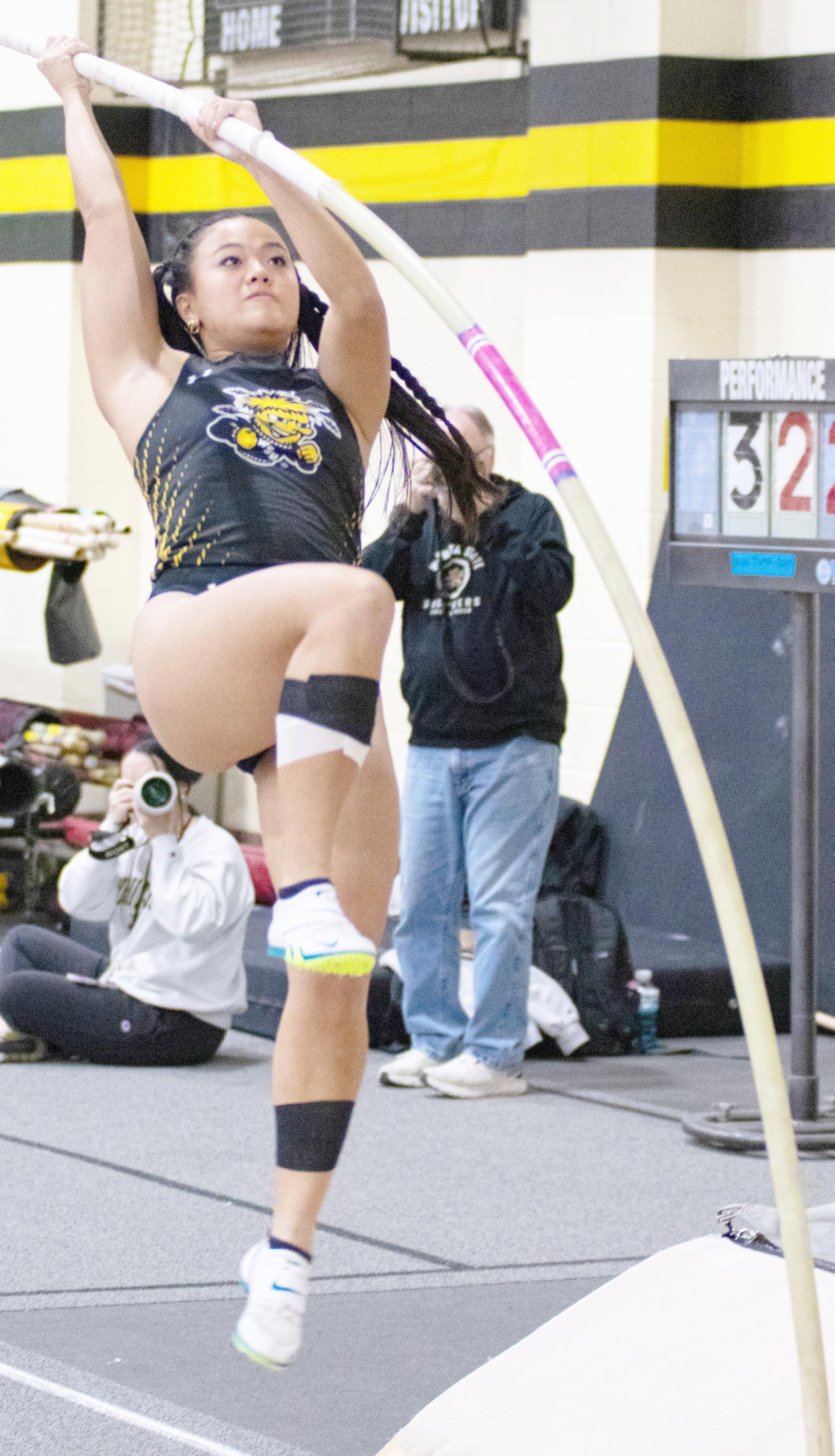
BY MYA SCOTT mds.200624@gmail.com
While many athletes aspire to be the next Stephen Curry or Patrick Mahomes, Wichita State track and field’s Abby Rexford has a different idol in mind: Joanna Gaines, the HGTV star of the show “Fixer Upper.”
Gaines “kind of does everything,” according to Rexford. Gaines renovates houses, owns a flower shop and is an entrepreneur — similar to Rexford, who is an entrepreneurship major. Rexford aspires to be like her and work at Magnolia Farms, one of the businesses Gaines and her husband own in Waco, Texas.
“I’ve actually been to Magnolia Farms twice,” Rexford said. “And it’s like Disneyland for me. I’ve never actually been to Disneyland, but that’s how I experienced Magnolia Farms.”
Rexford is a freshman pole vaulter for the Shockers. At West Jessamine High School in Wilmore, Kentucky, she was a two-time 3A State runner-up. Until the fifth grade, though, she’d never tried pole vaulting.
“I was a dancer all through my life and dance kind of had lost its shine and appeal,” Rexford said. “I wanted to definitely ... do something athletic, so track was the first thing that really came to my mind because I wasn’t really good at any other sport.”
During her fifth-grade year, her track coach asked her to try out pole vaulting. And despite her parents’ initial reluctance to let her try the event, Rexford said, “The rest is history.”
Throughout her teenage years, Rexford picked up a creative streak, participating in “grandma hobbies” such as sewing, crocheting, cooking, baking and painting. She originally started sewing because of her grandmother, who wanted to pass down her love of the hobby.
Track and field’s Luke Porter is ‘doing everything’ in his power despite injury
BY EVAN TONG
evantong3@gmail.com
The second-oldest of eight children, junior track and field athlete Luke Porter hails from a big Catholic family in Wichita.
“There were always little kids to be helped around,” Porter said. “I say that like it’s a bad thing. It really isn’t. You almost have a built-in best friend, too, all the time. I honestly think you learn a lot of good qualities. You’re not the center of the universe.”
When he’s not engrossed in his studies for the Medical College Admission Test (MCAT) or track practice, Porter works at the Human Performance Laboratory in the Heskett Center. Other than that, he still resides at home, helping out around the house.
“Taking care of so many of the younger kids,” Porter said. “It’s priceless. Family is forever, you know.”
Going into his collegiate sports career, Porter chose to stay home but admits that while he still sees old faces — like those of his seven siblings — there are plenty of new people to meet as a Shocker.
“Everyone goes on their own path,” Porter said. “One of my best friends from high school, his name is Will Anciaux (brother of WSU women’s basketball senior center Ella Anciaux), plays football at K-State. Every time he comes back to town, we catch up, we get lunch or we watch a football game at his house.”
Porter has a pedigree in track. His mother was a sprinter for the University of Iowa, running the 100-meter, 200-meter and 60-meter indoors.
In high school, Porter played four sports: baseball, basketball, football and track. He ended up doing both baseball and track up until his junior year when he said everything took off for him.
“I really liked doing the field events in track, but I didn’t know anything besides running,” Porter
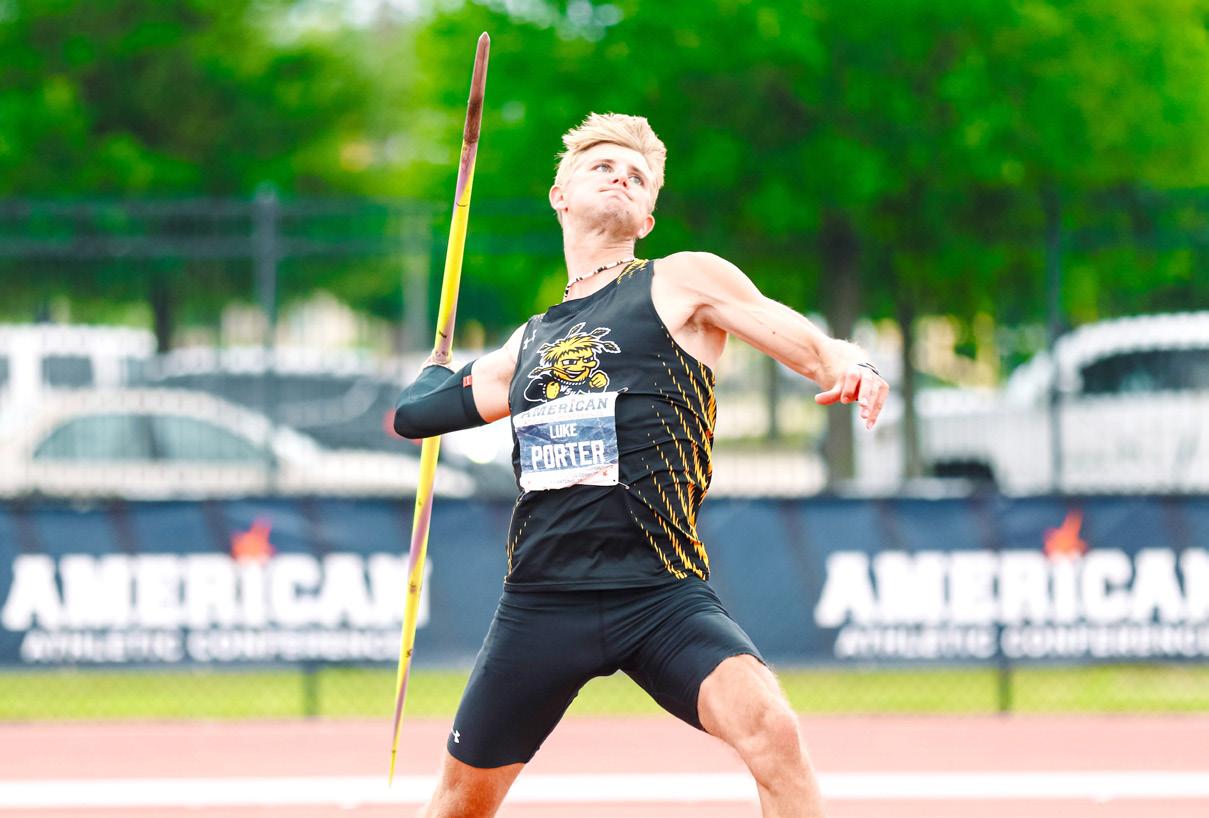
said. “I was like, ‘Whoa, I want to try and throw a spear.’”
Porter had a connection to Wichita State, as his father works at the university. His father got him in contact with former Shocker Aaron True, who holds javelin sessions in Emporia.
The Shocker connections do not end there. Porter’s track and field coach at Kapaun Mt. Carmel Catholic High School was none other than John Kornelson, the namesake of Wichita State’s annual home cross country meet — the JK Gold Classic — and coach of Kapaun’s track and field team from 1984-2000.
“He was like, ‘You should try the decathlon. I think you’d like it,’” Porter said. “So I went down to Humboldt, Texas, and qualified for the Junior Olympics. (I) found out I was pretty good at the decathlon. I reached out to some coaches and got connected with (track and field director) Steve Rainbolt. The rest is history.”
Porter turned down offers from other schools, including Iowa State University, two hours away from where his mother competed.
“Some of the people I was around were cutthroat, for the lack of a better term,” Porter said. “I just didn’t feel there was as much team chemistry. When I was here (at WSU), everybody was super close.”
Porter regards faith as one of the most important things in his life. He attends church regularly and is part of a Bible study group on the track and field team.
Senior Hudson Bailey, one of Porter’s teammates, describes him as “dedicated.”
“Right now, he’s trying to get into med school,” Bailey said. “That’s pretty much what he spends all of his free time doing right now, studying.”
And while Porter will likely miss this indoor track and field season with a Jones fracture, the decathlete plans to be back by the outdoor season.
A Jones fracture occurs when the bone connecting the pinkie toe to the base of the foot breaks. It is often caused by force put on the outside of the foot while it is twisted away from the body.
“Coming back from that, (the) progression is just tough because there’s not a lot of blood flow in that area of the foot,” Porter said.
“I’m doing everything in my power to make it happen.”
sewing machine ... I was probably a little too young to be using a sewing machine but just found a love for creating and sewing.”
While developing her love of creating, she simultaneously found a way to not let her athletics overtake her life.
“I like to stay busy and productive,” Rexford said. “I think using a creative outlet has been necessary to excel in sports because when you think about your sport all the time, it’s not good.”
Rexford said she has learned how important time management is to keep her creative outlets alive on top of her schoolwork and pole vaulting.
“Time is important,” Rexford said. “I view it more as a, ‘There’s a time for everything in life, and there’s a time when you’re at your sport.’ Just be fully present and try ... your best. And when you aren’t at your sport, you can think about it, but you don’t have to.”
Rexford has produced many works of art, such as flower bouquets and watercolors of the alphabet through flowers, but one of her favorites comes from her senior year of high school.
“I really love the idea of using things that people haven’t used before as textiles,” she said. “For my senior prom dress ... I made it completely out of pearls and just no fabric … taking second-hand thrifted items and remaking it into something new ... shows that things are meant to be reused.”
When Rexford isn’t making pearl dresses or flinging herself over a bar, she practices her faith, encouraging others to do the same. She suggests joining the Fellowship of Christian Athletes in Wichita.
Arantxa Cortez, a second-year pole vaulter, was one of the first faces Rexford saw while visiting WSU for the first time. Rexford said that Cortez helped persuade her to come to Wichita, as she knew there would be “good people and good pole vaulters.”
Cortez said one of the first things they did together was go to church.
“I grew up in a Catholic family in Peru and when I came here … I didn’t know what to do or how to get to my faith — work through my faith,” Cortez said. “So when Abby came here after one year that I was here in the U.S., she helped me through it, make it easy for me. I think she changed my life.”
Rexford, as an athlete and an artist, has learned to simply enjoy the process of all of her activities.
“(My grandma) gave my mom a
“The time it takes to do it, and the dedication, and I think that translates over to sports so well,” Rexford said. “I have to keep in mind, everything takes time, and instant gratification doesn’t come from everything, and it’s really taught me work ethic and just enjoying the process.”
How two Canadian track and field freshmen are adjusting to life in Kansas
BY KAMI STEINLE steinlekami@gmail.com
Moving to the American Midwest can be a difficult adjustment when coming from a city in Canada. Differences, from the nightlife to the weather, can be hard to get used to. For the 2024-25 school year, a few Canadian natives are finding out what Wichita has to offer.
When freshmen Cailey Freeze and Jett Hasiuk talked with coaches and colleges to find the best fit for themselves, Wichita State University offered what they needed most.
“I spent a lot of time training (in Canada) … I reached out to a lot of different coaches and I looked into the conferences (each school participates in),” Freeze said. “I just really liked the coach (director Steve Rainbolt) when we talked on the phone and when I came to visit. It felt like they had a very good team culture, and I thought it’d be a good fit for me.”
Freeze is a distance runner from Stouffville, Ontario, Canada, roughly 30 miles from Toronto, Canada’s most populous city. At WSU, she competes in distance events, running 800-meter, 1000-meter and the mile for track and field while also competing in cross country. But running track and cross country in Canada is very different compared to competing in Kansas, and not just in regards to scenery.
“At home (in Canada), I’m around a lot of big cities,” Freeze said. “That’s probably the main difference (between Canada and Kansas). It’s much more laid back here, but I’m getting used to it now.”
In Canada, Freeze enjoyed being close to Toronto. She would spend most weekends in the city with friends.
“There’s just always a lot of stuff going on in town (Toronto) on weekends, like festivals,” Freeze said.
Hasiuk, originally from Cochrane, Alberta, Canada, near
Calgary, Alberta, committed to WSU in December after receiving an offer to join as a sprints runner.
“I was talking to a couple coaches, but he (coach Conner Vaughn) was the first one to give me an official visit, and from there I committed right away,” Hasiuk said.
Hasiuk said the biggest difference between Canada and Kansas is the weather. In Canada, he enjoyed activities like skiing — a much less practical activity in Kansas. On the other hand, with the warmer weather, he can skate or train outside more often.
“The weather’s a lot better here, the sun’s out all the time,” Hasiuk said. “I really like being outside, competing at track meets, hanging out with friends in the summer … the training facilities are good, the people here are good.”
Hasiuk said adjusting to the Kansas weather was one of the best things about coming to WSU.
“I really like the warm weather, and there’s a lot more grass and less snow,” Hasiuk said. “The cold weather can be nice too, but I like being able to be outside in the summer.” Freeze is currently in the process of changing her major. Originally, Freeze was committed to forensic science, but after her first semester at WSU, she decided she wanted to get into medicine. When she graduates, she plans to become a nurse.
“I’m thinking I want to go into nursing,” Freeze said.“I haven’t decided on a major yet, but (I want to do) something with science.”
Hasiuk is majoring in business and isn’t set on a clear path after graduation yet, but plans to narrow his options down over the next few years.
“It’s going pretty well and I like the classes I’m taking,” Hasiuk said. “It’s a pretty light load, but I still get to learn a lot.”
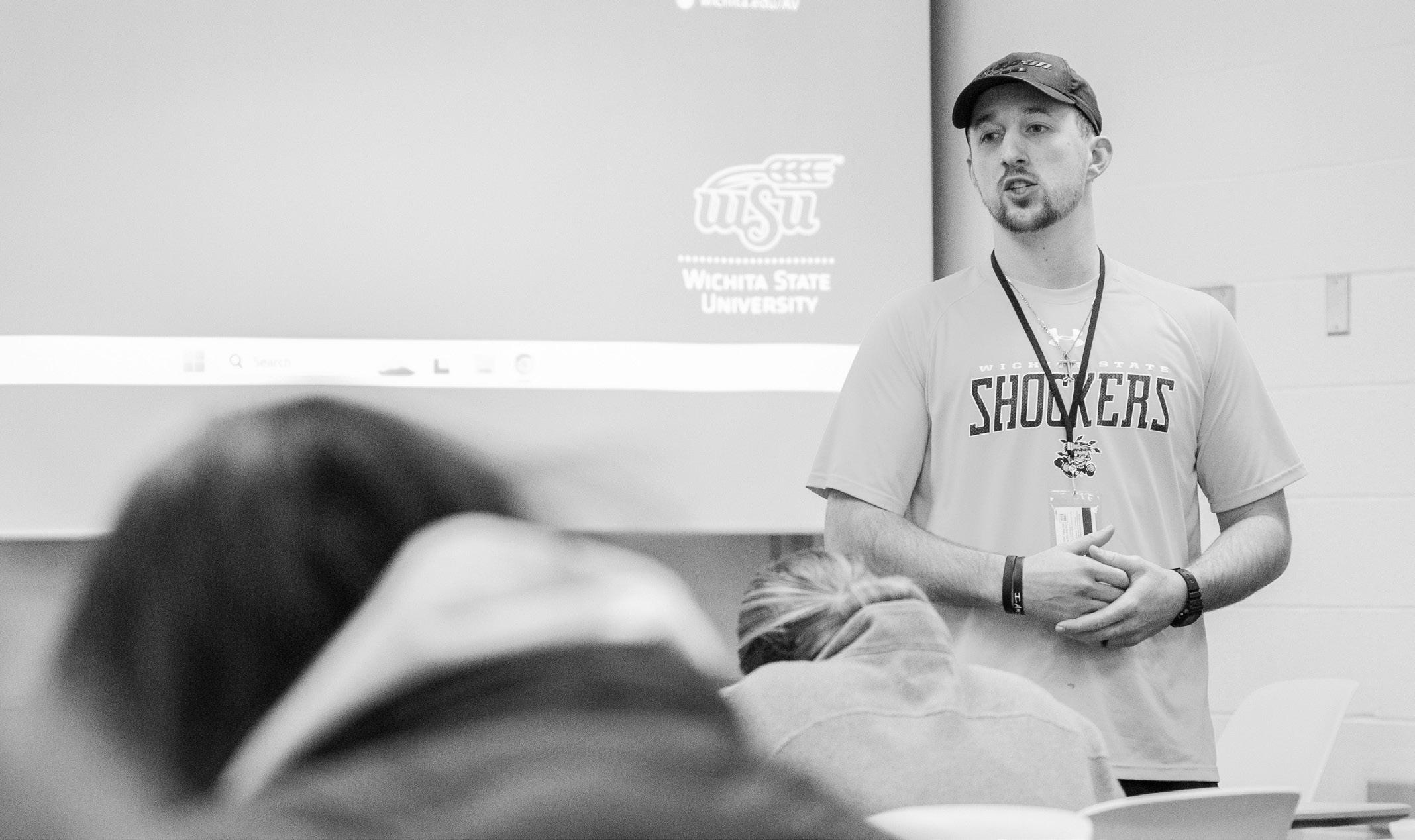
BY MIA HENNEN managing@thesunflower.com
If you’re in Remington Putter’s class, you might:
Be offered $20 to minimize your screen time, throw crumpled paper balls across the room or play a game of “Simon Says,” referred to as “Mr. Putter Says.”
“We have a lot of fun in here — not your traditional classroom,” Putter said as students threw snowballed paper across the room.
Putter is an adjunct instructor at Wichita State University. He teaches Health, Movement and Physical Activity, which shows students how to incorporate well-being into their future kindergarten to sixth-grade classes.
But he’s got his hands full with plenty else: He’s working toward a doctoral degree in educational leadership at WSU, teaching full-time with El Dorado School District and coaching WSU’s Disc Golf Club.
“It’s been a lot,” Putter said. “I’m definitely a task-oriented person, so I like to do well at what I do. And so I try to limit my priorities.”
It’s Putter’s first year coaching the club — as well as the club’s first time having a coach. Before, the club’s president and vice president filled that role.
“I’ve known about the club for the last probably two years,” Putter said. “And so I just contacted the president (at the time) . . . and I said, ‘Hey, you know, do you guys have an organized practice or anything that I can come to?’ And he said, ‘No, we don’t really have a coach.’”
So Putter went to try out. After making the team, he offered to coach them.
“I do have quite a bit of classes and experience with coaching, and so that’s (athletics) kind of been my passion,” Putter said. “... Coaching is a way that I can still stay in this sport and influence people.”
While he isn’t telling his players, “Mr. Putter says clap your hands,” Putter says his coaching and teaching style aren’t too different.
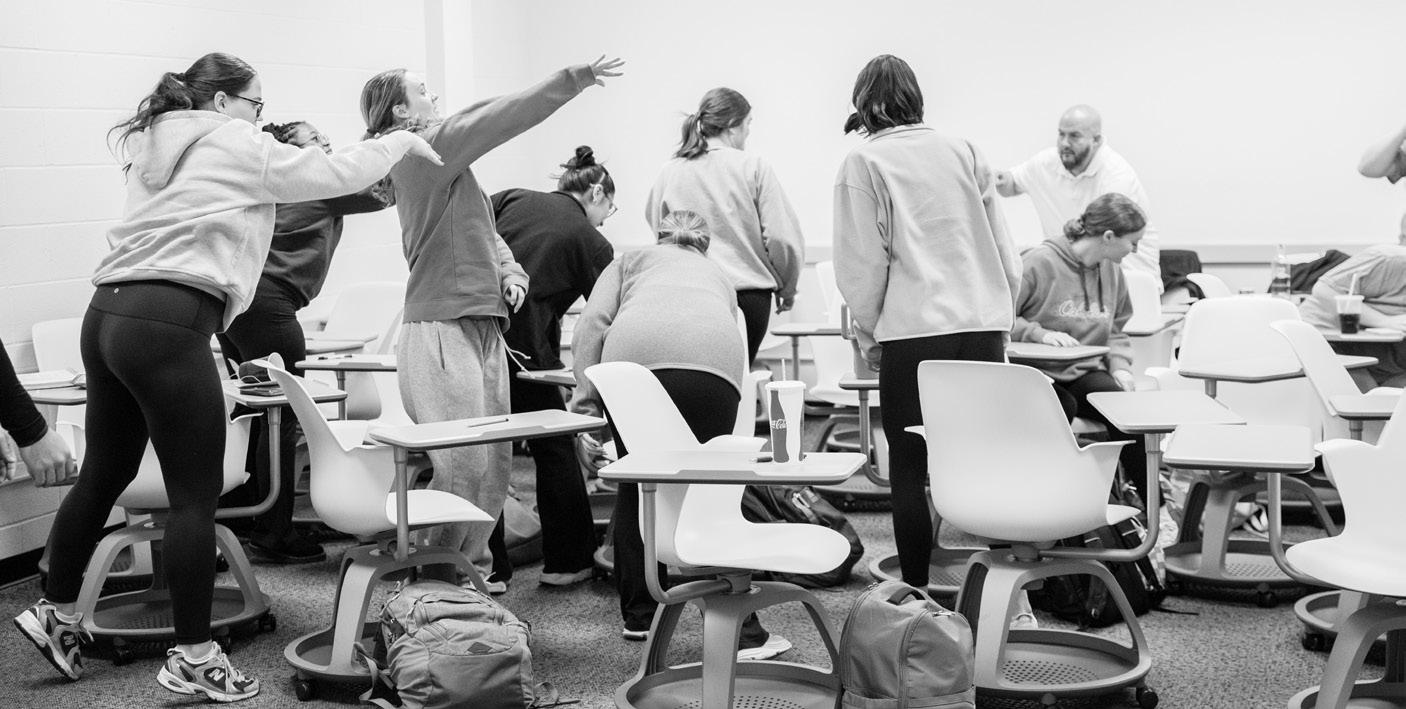
It’s definitely a time where you want kids to be active ... but it’s also a time where you teach kids about their bodies.”
REMINGTON PUTTER Adjunct instructor, Disc Golf Club
coach
“I like to run my practices … like my classroom,” Putter said. “I’m not a dictator, but I do like to be a leader. I like to make sure I get attention, and I get through what I need to, and then we have fun.”
For teaching, that means 30 minutes of educational activities at the beginning of each class. For disc golf, though, it means starting practices with 30 minutes of drills and lessons.
WSU’s current Disc Golf Club
President Isaac Spicer said practices look a lot different than in years prior.
“Usually, we play a round at disc golf — that’s pretty much all we did before (Putter was coach),” Spicer, who is an exercise science major, said. “So having Remington there gives us a little bit more to do, a little bit more to narrow down. And also just having some more advice when it comes to form.”
While Putter coaches the team, he’s also considered a player. Spicer said he and others are friends with Putter, who is
in his mid-twenties.
“It’s just more of an understanding that he also has a responsibility to actually teach us things and just help us improve,” Spicer said. “It’s definitely not quite the normal coaching dynamic that most teams would have, but … it works.”
Putter’s been involved with the sport for about four years, starting with him playing for fun during the COVID-19 pandemic. In the last year, he graduated from amateur divisions to play professionally in various Professional Disc Golf Association tournaments.
“I have always been a person (who says) ‘practice what you preach,’” Putter said. “And so I do have to seek out other people to give me some advice.”
As Putter continues his doctoral program at WSU, he hopes to keep coaching and playing disc golf. He said the intersection of physical activity, health and education is important to him.
“(Some people) see physical education as gym class or physical activity time,” Putter said. “It’s definitely a time where you want kids to be active … but it’s also a time where you teach kids about their bodies. You teach kids about skills, about sports, about activities, about movement, about balance, (about) control. You know all those things that you use in everyday life and for the rest of your lives.”
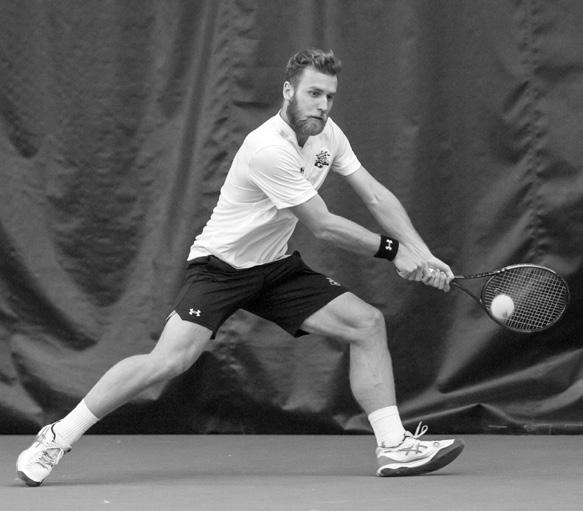
BY EVAN TONG evantong3@gmail.com
Junior tennis player Kristof Minarik is back for another spring season after suffering an elbow injury that caused him to miss almost all of last year’s campaign.
“It feels good (to be back),” Minarik said. “I’m still not completely healed. It’s still bothering me, but it feels nice to be able to compete again.”
Minarik suffered an injury known as “golfer’s elbow,” where pain is felt inside the part of the elbow connecting to the forearm. While the injury kept Minarik off the court, it didn’t prevent him from staying involved.
“Instead of practicing, I was just doing rehab,” Minarik said. “I was still hanging out with the team, cheering them on during the matches.”
During his recovery, Minarik did exercises that strengthened and stretched the elbow. In addition, Minarik took treatments such as ultrasound and red light therapy.
“It’s just been very repetitive, doing the same stuff all over again and not being sure if it’s helping or not,” Minarik said.
Minarik thinks that the lost confidence can be regained by simply playing more matches.
“We had some close matches,” Minarik said. “But it just proves that we were right there, and we can beat those teams. Once you keep winning, this just all goes together and helps you.”
WSU head coach Darragh Glavin thinks Minarik has come back stronger from his injury.
“I would say that he’s obviously mentally tougher out there,” Glavin said. “I think maybe in the past, he got frustrated easier. He’s just happy to compete again, but also the results are getting there. He’s seeing the success and still playing through pain.”
Although Minarik has felt good enough to return to the asphalt, he admits that he still isn’t 100%.
“(I’ve) definitely lost some confidence,” Minarik said. “It’s hard to not be competing for whatever, six (or) seven months, and still having some pain. But I don’t think I lost any ability to play tennis.”
BY RILEY SIPES
rsipes03@icloud.com
This is Piper Reams’ final year competing on the Wichita State women’s bowling team, but far from her last year bowling. Piper and her family consider bowling to be their legacy.
According to Piper’s parents, Laurie and Albert, the family comes from a long lineage of talented bowlers.
“My great grandfather, back in the 1950s, shot one of the first (perfect game) 300 shots in Phoenix, Arizona,” Laurie said. “Then my mother bowled, my grandfather bowled, and Albert’s parents and grandparents bowled.”
Piper’s parents were even introduced to each other while bowling competitively. They met at the Peach Bowl, a small, 10-lane bowling house in Haysville, Kansas, that has long since disappeared.
“We were both bowling (in a) league for different teams, against each other, and we just started talking and then started dating after that,” Laurie said.
Since their introduction in 1991, Laurie and Albert have bowled
recreationally and competitively. Throughout these 30 years, they have cultivated a supportive community.
“It’s a small community,” Laurie said. “But everyone brings their children and family to support them while they are on their journey.”
When Piper was only 2 years old, her father began bringing her to the bowling alley for his practices.
“She would go to the bowling alley with me on Monday night, while her mom was in class,” Albert said. “You could tell she liked the atmosphere because she would give the guys high fives on the team. You could see she thought about doing it herself, even though she was just little bitty.”
The community Laurie and Albert built was something Piper became enamored with immediately.
“I just fell in love with (bowling), and my parent’s love for it helped that love grow,” Piper said.

Piper began bowling competitively when she was 12. However, the tournaments she participated in focused more on her skill as an individual rather than team effort. As a teenager, she joined the women’s bowling team at Campus High School in Haysville. Her experiences on the team and bowling individually outside of school gave Piper the chance to
build a community similar to her parents’, one she still interacts with to this day.
“Being able to go to tournaments that are far away and see (my old friends) knowing that I haven’t seen them in a while is so comforting,” Piper said. Over the last decade Piper
has been competing, Laurie and Albert have tried not to miss a tournament.
“You see the joy on her face when we’re there,” Albert said.
“We’re always there for her and we’ll always continue to be there for her. It’s an amazing opportunity for us also.”
In 2024, the Wichita State women’s bowling team won its 11th Intercollegiate Team Championship national title. Shortly after their win, the team transitioned to an NCAA sport.
Piper said the achievements throughout her collegiate bowling career have been, in part, due to her parents’ unwavering support.
“They know how important it is to me,” Piper said. “Ever since I was young, all I got was support from them.”
But she said the personal fulfillment she receives from doing what she loves is hers alone.
“Bowling has brought me so many amazing friendships that I am so blessed to have found,” Piper said. “I love the competitive edge bowling has. I love the strategy that goes into the game because it’s constantly changing.”
BY SOPHIA BEST & AINSLEY SMYTH sophiadapbest@gmail.com & news@thesunflower.com
A Kansas House bill filed last Friday aims to alter tenure for faculty in the state’s post-secondary institutions.
Opponents, including faculty members at Wichita State University, say it would weaken protections for tenured faculty’s employment and has the potential to limit protections for academic freedom.
“(The bill) would effectively end the conferral of tenure for faculty members at state universities in Kansas,” said Chase Billingham, a WSU associate professor of sociology and faculty senator, at a Faculty Senate meeting on Monday. “It would strip tenure protections and seriously undermine job security for all professors in the state.”
Tenure refers to a permanent teaching position for professors, which only allows termination under specific conditions.
At Wichita State, tenure is awarded based on a faculty member’s “demonstrated excellence in scholarship, teaching/ librarianship, and community and professional service,” according to the university’s policy. After being awarded tenure, faculty can only be terminated “for adequate cause” or under “extraordinary” financial circumstances, according to WSU’s official guidelines of tenure and promotion.
TENURE
If passed, House Bill No. 2348 would leave tenure to the discretion of a university, but it wouldn’t grant teachers the guaranteed protections of employment previously offered.
While the bill still permits tenured faculty members to “confer certain benefits, processes or preferences,” it would become a discretionary and conditional process that would not create entitlement, right or property interest.
The bill was introduced by Rep. Steven Howe at the request of Emporia State University’s General Counsel Steven Lovett.
In a hearing on Tuesday, Lovett said he was pushing for the bill as a private citizen, not at the request of Emporia State.
Since 2022, ESU has been the center of several state and federal court battles due to the decision to fire 30 tenured or tenure-track professors. Lovett is currently a defendant in the federal case regarding ESU’s decision to terminate the faculty members. His involvement in the bill poses a potential conflict of interest, according to the Kansas Reflector.
During Tuesday’s Kansas House Committee on Judiciary meeting, Lovett spoke in favor of the bill before the committee. He called tenure, as it currently is, an “employment liability,” arguing that tenure restricts universities from terminating faculty due to financial constraints, and the process required to remove tenured faculty is too lengthy.
“The property right of tenure as it is currently characterized in the state of Kansas impedes or restricts the needed change of higher education in our state,” Lovett said.
Faculty from several Kansas universities and George Burdick, the student body president at Washburn University, spoke against the bill. So did Blake Flanders, the president and CEO of the Kansas Board of Regents (KBOR), Kansas’ governing body for higher education.
Flanders said KBOR opposes the bill because it would harm the recruitment of faculty at the state’s public universities. He also expressed surprise at the rate in which the issue was brought to the legislature.
“We do have a very robust process where individuals bring non-budgetary legislation to the board,” Flanders said. “If improvements are needed in the current structure, I want to say the board wants to be engaged and looks forward to meeting with you.”
Kansas State University
President Richard Linton and University of Kansas Chancellor Doug Girod also spoke in opposition of the bill at the hearing.
Despite WSU Faculty Senate President Mathew Meuther assuring WSU faculty that he would be attending the committee meeting, leadership from Wichita State was absent.
WSU President Richard Muma addressed the bill in a statement provided by Director of Strategic Communication Lainie MazzulloHart. While he wasn’t able to attend Tuesday’s hearing, he said he opposes House Bill 2348.
“Tenure is a critical component of a research university, and I fully support our faculty and the opportunities and protection tenure affords them in their teaching and research,” Muma’s statement read.
“We have been communicating the importance and impact of tenure to appropriate elected officials as well as the process for earning tenure and tenure review.
“If passed, this could have a detrimental effect on WSU’s ability to retain and recruit faculty and students, would negatively impact essential research, and would, in the long run, hurt the Kansas economy. I am in close communication with the Kansas Board of Regents and support their stance on this issue.”

The proposal of the bill has left many Wichita State faculty members feeling nervous, including Billingham. During the Faculty Senate meeting, he spoke of how this could threaten faculty’s ability to conduct research.
“(Tenure) allows researchers in all disciplines to pursue promising research without fear that their investigations will be viewed as too esoteric or too abstract or too controversial,” Billingham said. “As such, it is essential to the creation of new knowledge.”
Senators discussed the bill extensively during their Monday meeting. Sen. Aaron Bowen, an instruction and research services librarian, said he found the news deeply troubling.
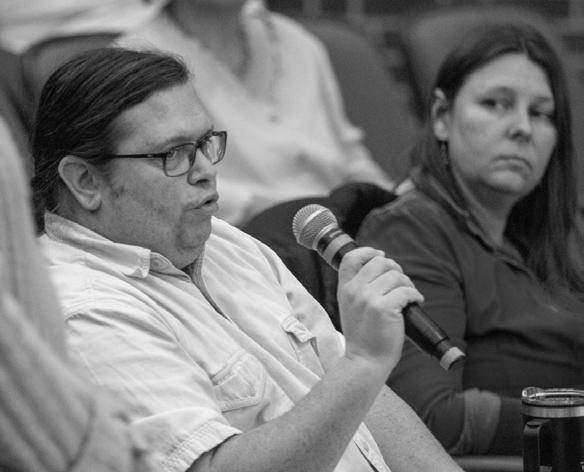
“Every state-run university across the entire state — this is going to be a significant problem for them,” Bowen said, “(The bill) I think is a deeply concerning problem that does not make me want to work in Kansas.”
Senators also surmised that, if passed, the bill would make it “very difficult, if not impossible” to support educational initiatives like the Wichita Biomedical Campus and obtain R1 status.
Wichita State is currently an R2 university. To become R1, schools need very high research activity. Along with national recognition, R1 status would grant more
opportunities for federal funding.
“The university’s stated goal is to try and attain R1 status; that is not going to happen if this legislation passes,” Bowen said. “Obviously, we will have no chance of gaining R1 status under these conditions, nor will any other university in Kansas.”
Others, like Sen. Susan Sterrett, a philosophy professor, worried that the bill’s intent is simply to prevent faculty from criticizing or holding collegiate institutions accountable.
“You get a sense that there’s people who just want us to feel scared, just want us to feel that our jobs are contingent,” Sterrett said.
“Not because they really want to take them away, but because they just want to … make us feel fearful of criticizing (universities).”
In response to the faculty’s concerns, Chief of Staff and Executive Director of Government Relations Zach Gearhart shared that he and other leaders at Wichita State had spent “most of the weekend analyzing its (the bill’s) contents, impact on faculty and the university.” He said Muma did not support and “does not believe (the bill) is remotely necessary” for Wichita State.
“I can tell you now (that) the president is very committed to continue to support our faculty, as we’ve always done,” Gearhart said.
By the conclusion of Monday’s Faculty Senate meeting, Meuther said he would meet with other Senate executives to determine if an emergency meeting could be held.
As of Wednesday afternoon, the Faculty Senate has not called for an emergency meeting. But Gearhart said he’ll continue to work with Muether, Muma, Kansas Gov. Laura Kelly and KBOR to “identify a strategy and a way to make our opinion and our views on this known.”
Connie Morris, former Elliott School faculty, dies at 82
BY AINSLEY SMYTH news@thesunflower.com
Most Wichita State students have taken Public Speaking (COMM 111). The course is required to graduate and, for some students, it might be the only communication class they’re ever in.
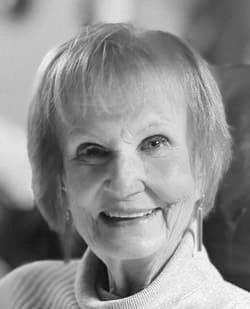
Connie Morris taught at WSU for more than 35 years and helped shape its public speaking classes. Morris, a retired faculty member with the Elliott School of Communication, died last week at age 82. Former colleagues remember her as an inspiring mentor, a caring teacher and a friend.
“Connie was such a great educator, and students loved her,” said Sandy Sipes, a senior educator at the Elliott School.
Before working alongside Morris, Sipes was her student. When she came to Wichita State to pursue her second degree, in teaching, Sipes ended up in Morris’ Comm 111 class.
“She became, very quickly, my mentor,” Sipes said. “I loved her teaching style. I fell in love with the class, even though I was dreading taking it, and by the end of the semester, Connie and I had talked a lot, and she said, ‘I know you want to teach, but why don’t you apply for the graduate teaching positions at the Elliott School?’”
Sipes has been teaching at WSU ever since.
According to Eric Wilson, a senior educator at the Elliott School, Morris was fundamental in cultivating the school and its public speaking program.
The Elliott School formed in 1989 when WSU’s Speech Communication and Journalism departments merged. When they merged, Morris followed.
“I think just (her legacy is) the reputation for strong teaching, for having a strong (communication) studies and a public speaking program,” Wilson said. “She was, I think, instrumental in helping establish our comm 111 public speaking program and advocating for that at the university.”
Sipes said Morris was “a stickler for research.”
“She really instilled in me that ethical, moral compass of — if you’re going to talk in front of people, you better know what it is you’re going to say and you have to be ethical in what you say and truthful in what you say because what you say matters,” Sipes said.
Becky Nordyke is a former Elliott School faculty member. She said she and Morris had been friends for years, ever since Nordyke started working at the school.
“I moved here and didn’t know anyone,” Nordyke said. “(Morris) got me acclimated to Wichita and to the speech department, and became my mentor, my friend and my lunch date.”
She said she saw Morris just days before she went into the hospital.
“It’s just really hard to believe that she was here and just gone,” Nordyke said. “It’s pretty devastating for a lot of people because she was such an institution in our department.”
BY KAMI STEINLE news@thesunflower.com
Kansas Gov. Laura Kelly vetoed a bill on Tuesday that aims to ban gender affirming care for minors in the state.
Wichita State’s Student Government Association Sen. Evelyn Lewis said the passing of the bill would only hurt the transgender community.
“This is going to make transitioning more complicated,” Lewis said. “Already, it takes too long as an adult to get gender affirming care.”
Kansas legislators recently passed the Help Not Harm Act
which would ban access to genderaffirming care for minors.
With 88 Republicans in the House and 31 in the Senate this year, Republicans have the supermajority required to overrule the veto.
While Kelly vetoed the bill, the House and Senate could override it with a two-thirds vote from both bodies.
“If her veto gets overridden, we’ll have to wait and suffer through it,” Lewis said. “It’s terrible and it hurts a lot.” If passed, the bill would restrict state funding for gender-affirming services and prohibit any health
professional from providing care that is inconsistent with a minor’s assigned sex at birth. Physicians who provide any of these services would also face legal repercussions.
Ruby Godsey is the outreach chair for the Wichita State student organization Spectrum: LGBTQ & Allies. Godsey said this kind of care is invaluable for minors.
“It’s extremely important for youth to have access to these resources,” Godsey said. “As someone who’s been lucky enough to have started hormone therapy, it has impacted my life in a positive way.”
Lewis said even without legal limitations, it’s difficult to access this kind of care.
“Not many hospitals in Kansas support or offer that kind of care already and the drugs are very expensive,” Lewis said. “But a secondary effect of this bill is that it will encourage further discrimination of transgender people and transgender youth. That’s going to hurt them, too, maybe even more than the primary effect of the bill.”
Medications such as puberty blockers and transition surgeries would no longer be available to minors under the bill. Physicians
who have already prescribed these medications to children would have until Dec. 31, 2025, to evoke prescriptions. All state-owned facilities and employees would also be prohibited from encouraging social transitioning.
Godsey worries the bill would serve as a gateway to more invasive legislation.
“The bill is called ‘Help Not Harm,’ but that’s the opposite of what they’re doing,” Godsey said. “It’s important that we understand that and that they (Kansas legislators) understand that, but there are still avenues that can help trans youth.”
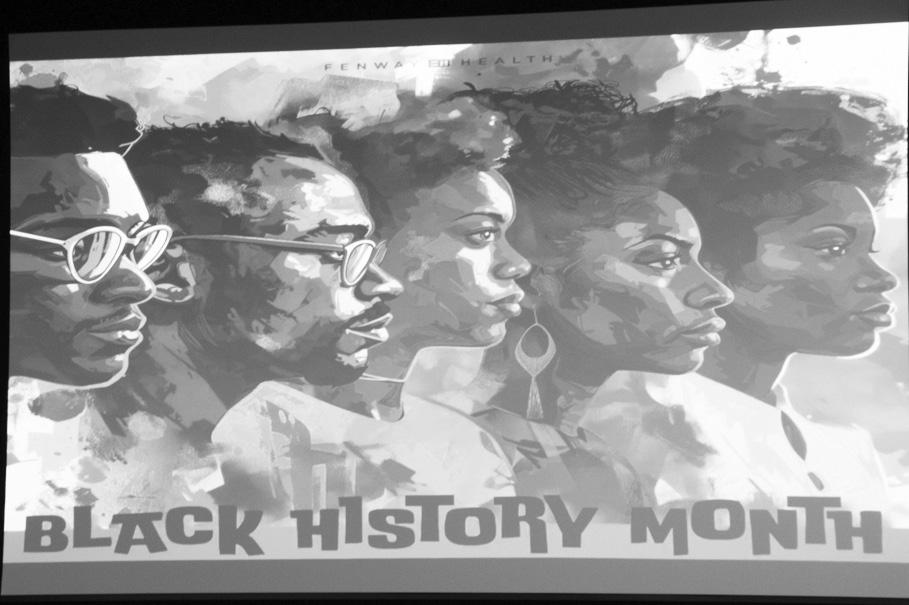
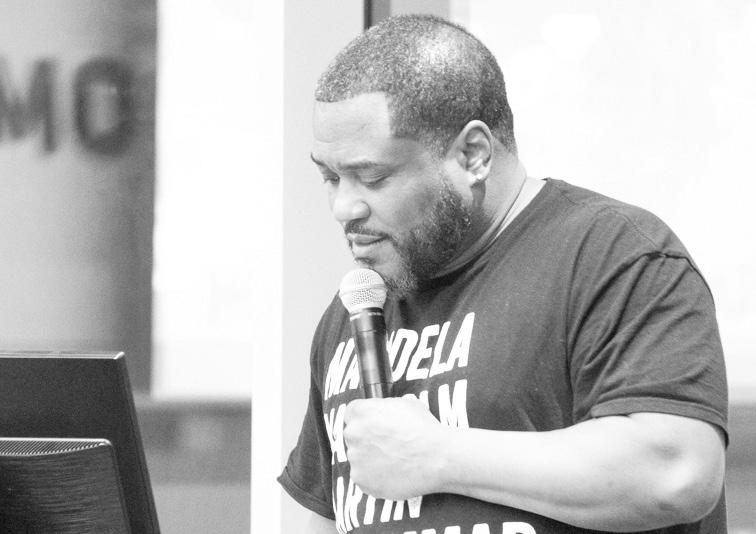
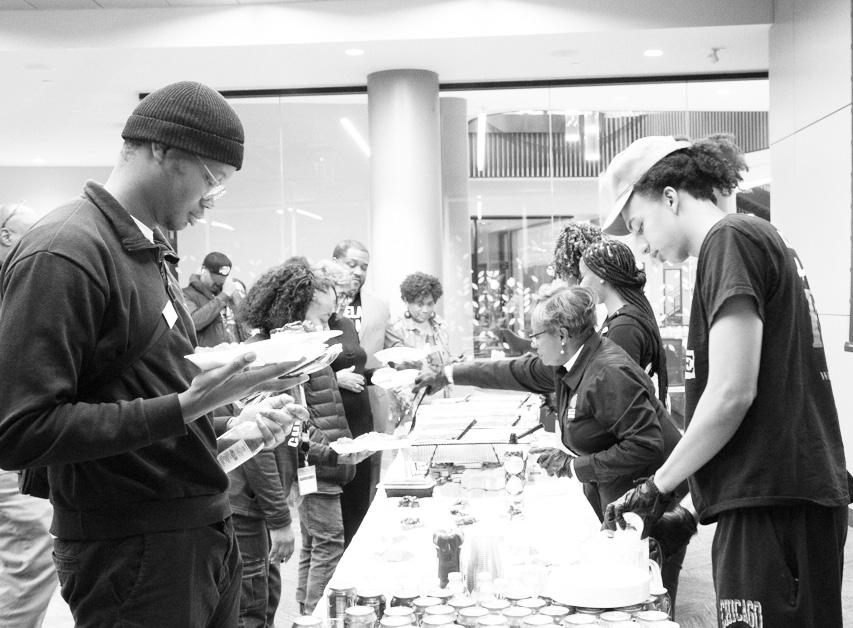

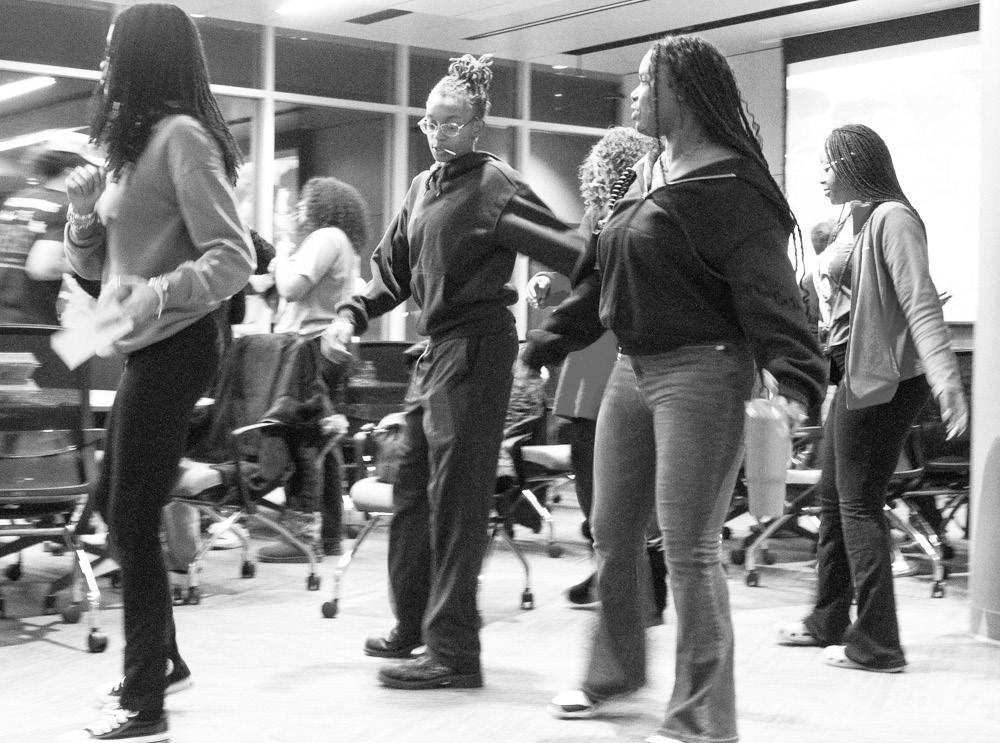
BY MALEAH EVANS arts@thesunflower.com
Wichita State University has begun its series of Black History Month celebrations.
The Black Student Union (BSU) and African American Faculty Staff Association (AAFSA) invited students and staff to a Black excellence celebration with music, line dancing, games and soul food on Feb. 7. Kevin Harrison, an assistant teaching professor and honors faculty fellow, was an honorary speaker.
Black History Month started as a way to remember important people and events in the history of the African diaspora. Originally, it lasted a week before becoming a month-long observation in 1970.
In the United States and Canada, it is celebrated in February and, recently, it has been celebrated in October in Ireland and the United Kingdom.
The original idea was born in 1926 when Carter G. Woodson and the
If you live on or near Wichita State University’s campus, you have probably seen the restaurant Fuzzy’s Taco Shop in Braeburn Square. For many students, Mexican cuisine is what draws them to the building. Others are drawn to the weekly trivia nights.
“Everyone’s there to hang with friends and have a good time — that’s the real goal of trivia night,” Fuzzy’s worker Ryan Meyer said. Trivia night takes place every Monday at 7 p.m. with prizes for the top three teams. First place wins a $25 gift card, second place wins a $15 gift card and third place wins a $10 gift card.
Klete Keller is a sophomore majoring in animation. He has worked at Fuzzy’s since June, and has previously been scheduled to work during these trivia nights. Keller also gave some insight into how trivia night works behind the scenes.
Each week, six rounds of trivia are created, with 10 questions per round. According to Keller, a lot of the topics are based on personal interests, from music to history.
Association for the Study of Negro Life and History announced that the second week of February was to be “Negro History Week.” It was chosen because it coincided with the birthdays of Abraham Lincoln and abolitionist and orator Frederick Douglass.
In February 1969, Black educators and Kent State University faculty proposed Black History Month, and the first celebration took place at Kent State in 1970. President Gerald Ford recognized Black History Month in 1976 during celebrations for the United States Bicentennial.
Wichita State is hosting a Black excellence career fair on Feb. 13 from 11 a.m. - 1 p.m. The event, located in the Rhatigan Student Center, will offer networking and insights from Black professionals.
On Feb. 15 at 7:30 a.m. the Student Activities Council (SAC) will take students to Kansas City to explore the heritage of Black Americans. The trip will include visits to the American Jazz Museum, the Negro Leagues Baseball Museum and a solo visit to the Crowne Plaza.
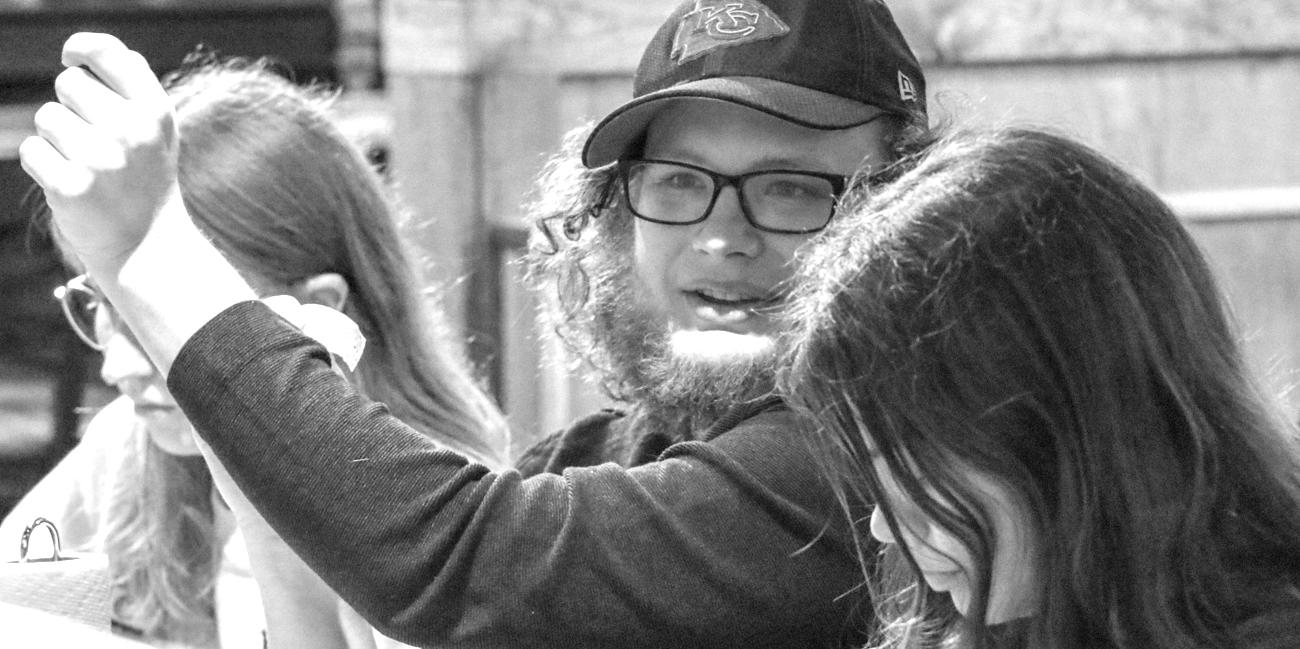
Most of these questions are taken from trivia regulars, who Meyer has come to know well. Meyer runs the weekly trivia nights at Fuzzy’s. He works to gauge attendees interests in order to create more immersive and fun categories for these customers.
“I try really hard to make sure I don’t repeat categories, so it doesn’t favor a team that’s only good at one topic,” Meyers said. “I try to make sure there are questions and content for any person of any kind that comes in, especially in terms of non-white and queer content that
has been largely excluded from traditional trivia knowledge.”
The Morris family has made trivia night a family tradition, and Elijah Morris, a freshman studying history, has been coming since he was 17.
“My 17th birthday, my parents asked me to come out and try some trivia with them, and we’ve been going ever since,” Morris said.
While for some, it was something introduced to them through family, for others, trivia came into their lives through pure chance.
“I heard about it through an
BY MALEAH EVANS arts@thesunflower.com
As of Jan. 24, the Ulrich Museum of Art has new hours of operation.
The museum will be open Tuesday, Wednesday, Friday and Saturday from 11 a.m. to 5 p.m. On Thursdays, the hours are 11 a.m. to 8 p.m.
In its Instagram announcement, the museum said the new hours will allow people more time to enjoy the art and exhibits on display.
It will remain closed on Sundays and Mondays, as well as during university and major holidays. Previously, the museum was open on Mondays.
SENIOR WEDNESDAY
WEDNESDAY, FEB. 19
10 - 11:30 a.m.
Spring exhibition curators will discuss the process of building the four new exhibits on view.
VISITING ARTIST TALKDEVAN SHIMOYAMA
THURSDAY, FEB. 27
6 p.m.
Devan Shimoyama will share his creative process, experiences and inspirations about his spring exhibition “Devan Shimoyama: Rituals.”
TELLING YOUR STORIES
PHOTOGRAPHY EXHIBITION
MARCH 4-15
NEW MUSEUM HOURS
A competition in collaboration with Wichita State, Wichita Links Inc, Wichita Public Schools and the Kansas African American Museum, it displays the stories and challenges of students through the lens of life experiences.
ARTIST WORKSHOPLUMEN PRINTS WITH KENDRA CREMIN
THURSDAY, MARCH 6
5 - 7 p.m.
Kendra Cremin will share her knowledge of lumen prints, followed by a demonstration. Participants will be able to create their own pieces.
WRITING NOW READING NOW - LADEE HUBBARD
TUESDAY, MARCH 11
6 - 7 p.m.
Ladee Hubbard, the author of “The Talented Ribkins” and “The Rib King,” will present a fiction reading.
ad and thought it would be fun to come out and try with a couple of friends,” said Kassidy Adams, a senior majoring in biochemistry. Meyer said the energy of the establishment is palpable and people really get into it. He recommended that guests bring some friends and enjoy the food and trivia.
“Bring a couple friends and make sure you’re well-rounded — a science person is just as valuable as a sports person, for example,” Meyer said.
WICHITA TRIVIA
Want to know where else to catch trivia around the city?
MONDAY
BRONX PIZZA & PINTS
7 p.m. and free to play
CHICKEN N PICKLE
7 p.m. and free to play
TUESDAY
CANDLE CLUB
6:30 p.m. and free to play
OLD CHICAGO
9 p.m. and free to play
WEDNESDAY
ZIGGY’S PIZZA WEST
7 p.m. and free to play
MORT’S MARTINI AND CIGAR BAR
8 p.m. and free to play
THURSDAY
MELLARD’S MUG SHOTS
6:30 p.m. and free to play
HOPPING GNOME BREWING COMPANY
7:30 p.m. and $1 per person to play
BY OWEN PROTHRO owenprothro@gmail.com
Going into his 15th season as head coach of Wichita State’s women’s tennis team, Colin Foster said the team is “farther along than we normally are at this point of the preseason.”
Foster said the group is bought in, hungry and excited to get the season underway.
“We’ve made significant progress and improvements across the board,” Foster said. “Normally … certain players are going to kind of make a push results-wise in their games and confidence-wise. But we feel like any of the eight players (on the roster) can be … that player that continues to make those pushes because they all made significant improvements in the fall.”
Last year, the Shockers finished with a 13-10 record, the team’s best in five years.
After the end of the spring 2024 season, senior Natsumi Kurahashi, a cornerstone and leader on the team, graduated.
Foster expects sophomore Xin Tong Wang to play the majority of singles matches on the top court this spring after amplifying her game in the fall.
Wang became the first women’s tennis player to advance out of the singles pre-qualifiers of the Intercollegiate Tennis Association (ITA) All-American Championships since 2009 and the first women’s player to reach the ITA Central Region Championships singles final since 1983. She also qualified for the NCAA Singles Championship, but her run was cut short due to a sprained ankle.
But Foster doesn’t expect the ankle sprain to affect her play.
“It wasn’t … such a significant ankle sprain to keep her out too, too long,” Foster said. “She was out a couple weeks and … is good to go.”
Still, Foster said the team is competitive enough that the spot may be fluid; more than one player may hold it throughout the season.
“There’s other players on this roster that I know have goals to play at the top of the lineup as well,” Foster said. “I mean, everyone’s pushing each other, and we want that competitive element within the team … that’s going to only make all of us better and make the team collectively better when we have that competitiveness for lineup positions.”
As far as replacing the vocal leadership of Kurahashi, Foster emphasized that it’s going to be a group effort to fill the role.
Junior Theodora Chantava agreed that it will take more players to step up and be that vocal leader.
“We’re trying to (get) everyone (more vocal). And the coaches really emphasize that,” Chantava said. “It’s a challenge for those who are a little bit not so loud. It’s a good challenge to challenge themselves and overcome them.” Foster said the biggest difference between this season’s team and last season’s is the ability to finish matches and dig out crucial wins.
“Last year’s team, we were close in several matches,” Foster said. “And I think this year, we’ve put in that little bit of extra work that is going to give us belief to get over the finish line in some of those moments that maybe we didn’t quite have enough … gas in the tank or belief in the heart or whatever, to execute in those crucial moments last year. This team has already shown that they’ve got that in them and that comes from the work they’ve put in.” Foster said the expectations for this team are simple: compete for a conference championship and play in the NCAA Tournament.
“Those are kind of the benchmarks that we’ve put out there,” Foster said. “I’ve been around enough to know that this team has that in them to compete for a conference championship, win a conference championship and advance to the NCAAs, so that’s the goal.”

